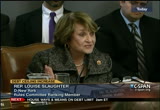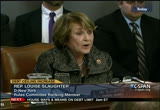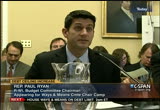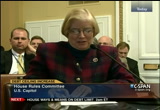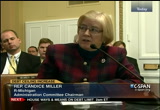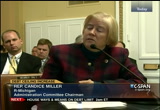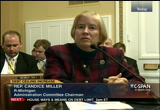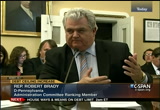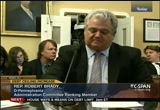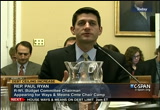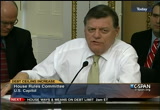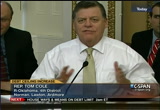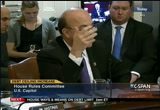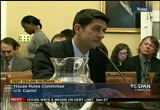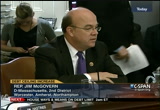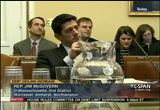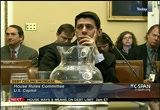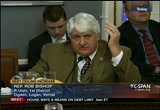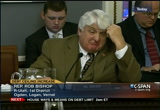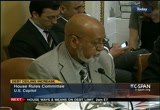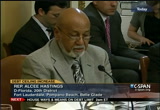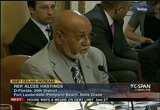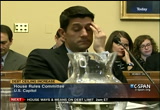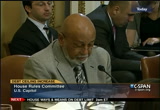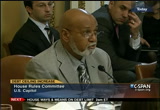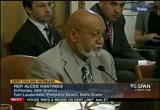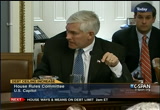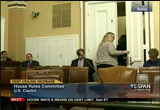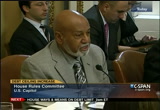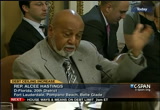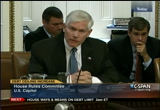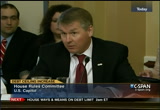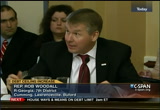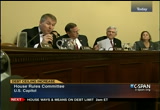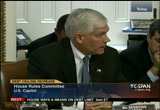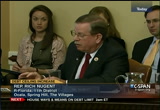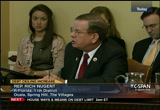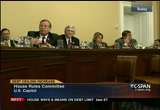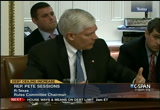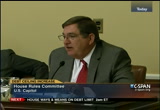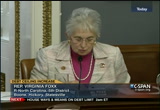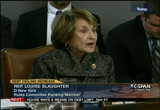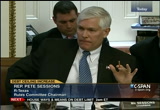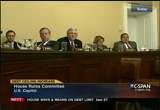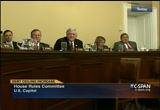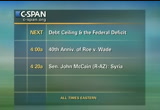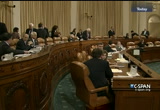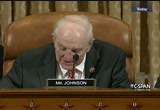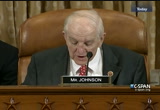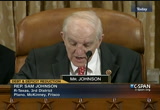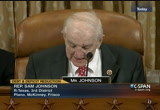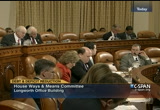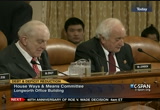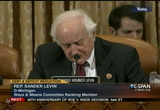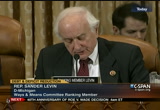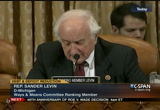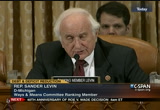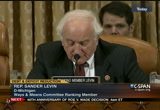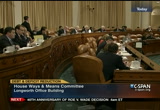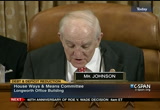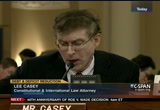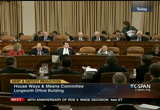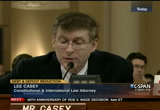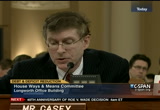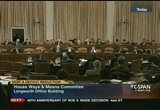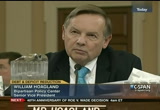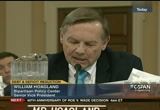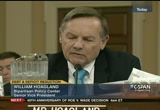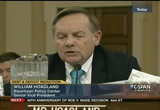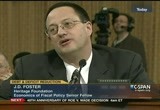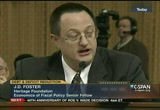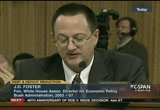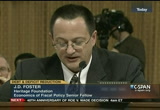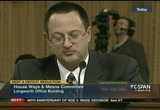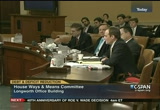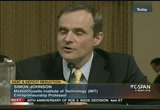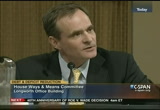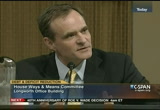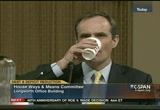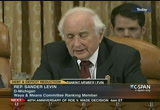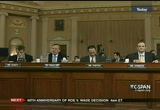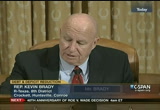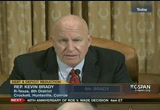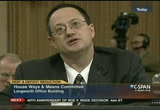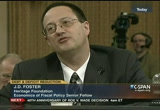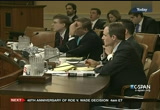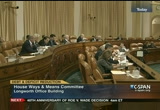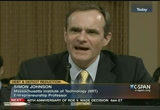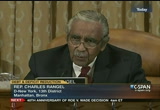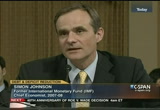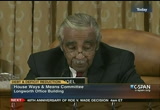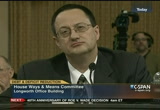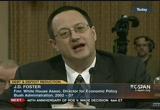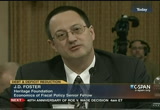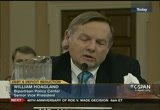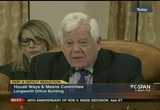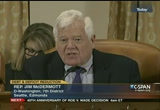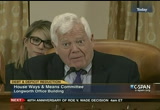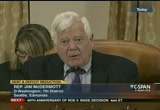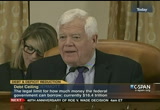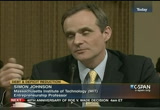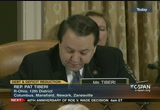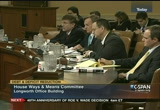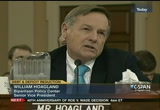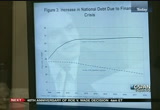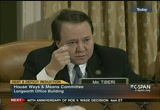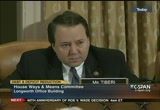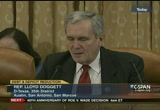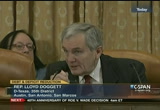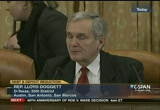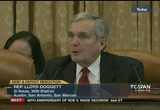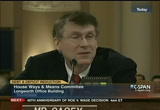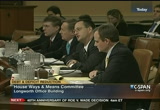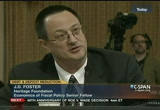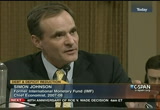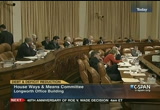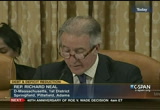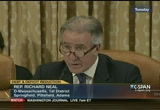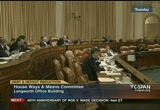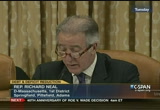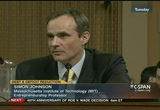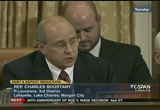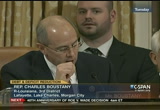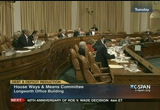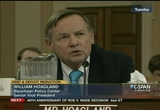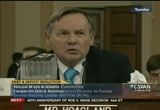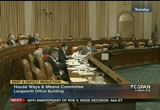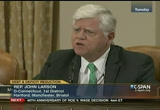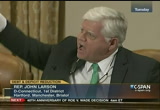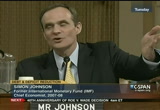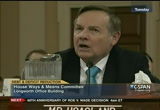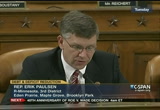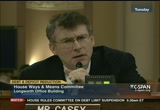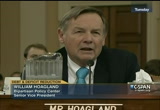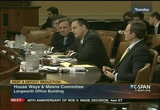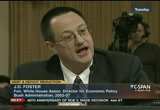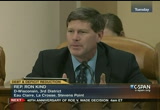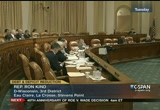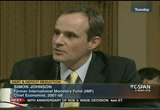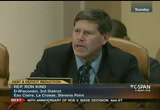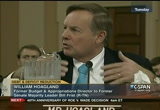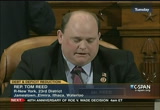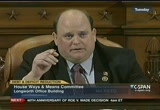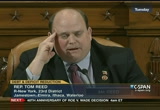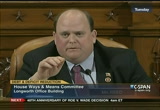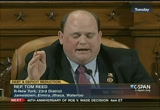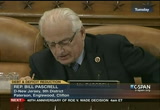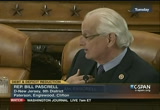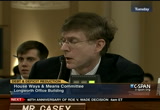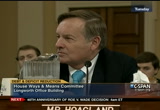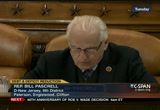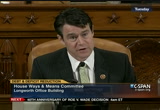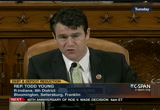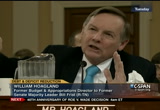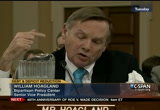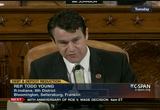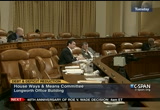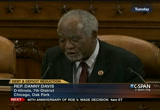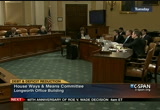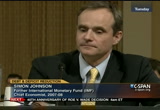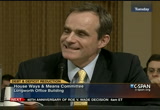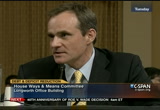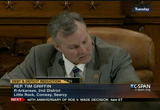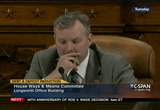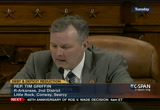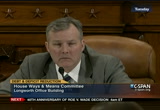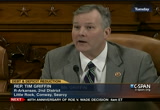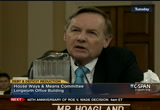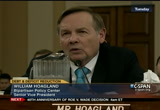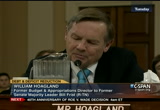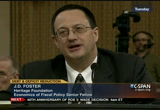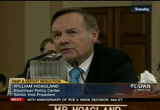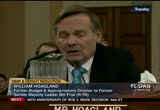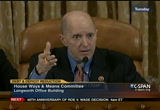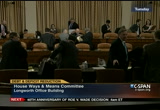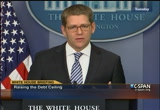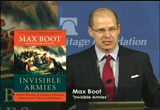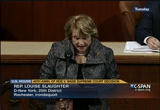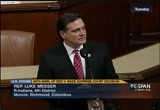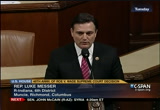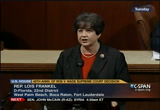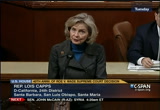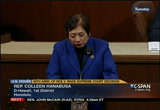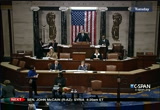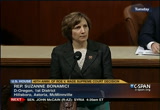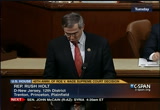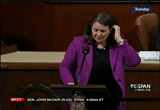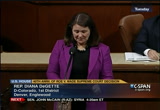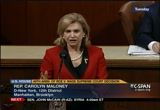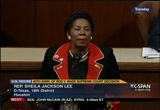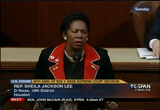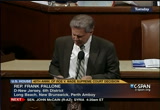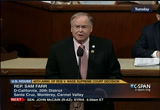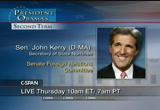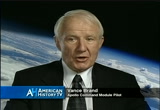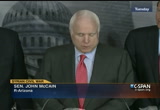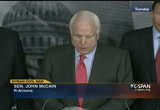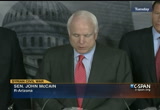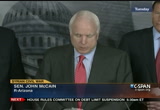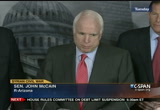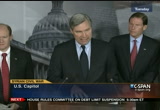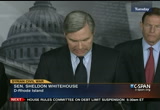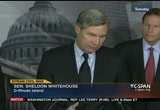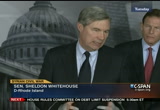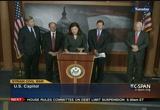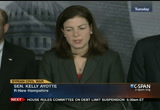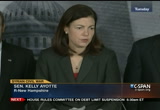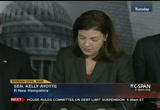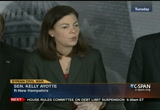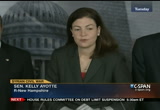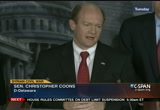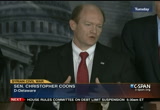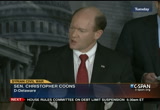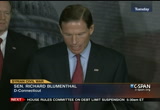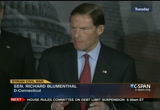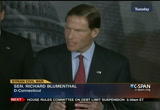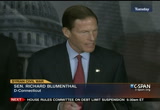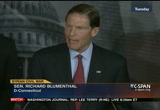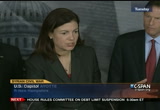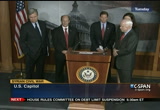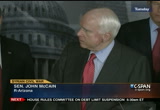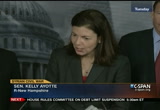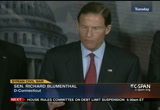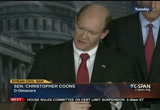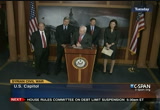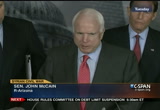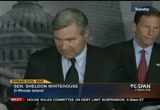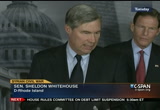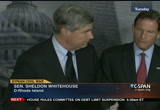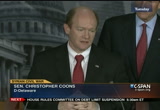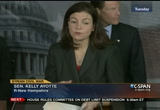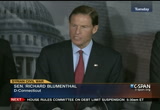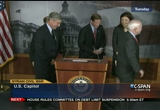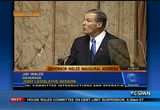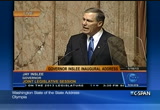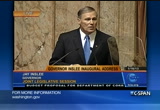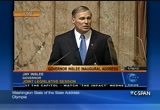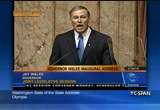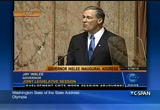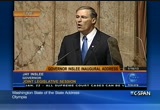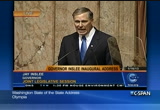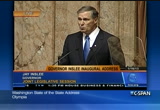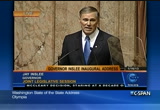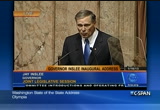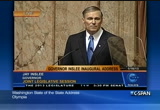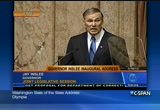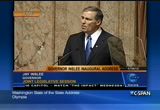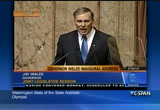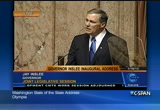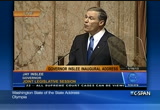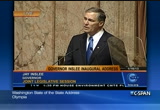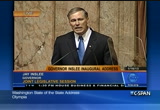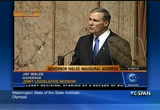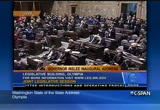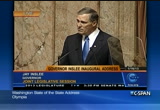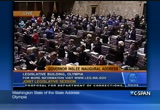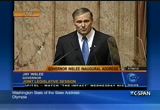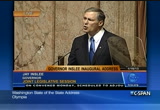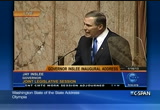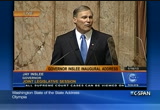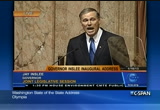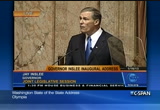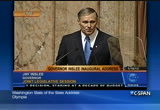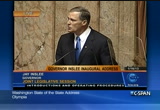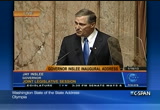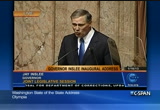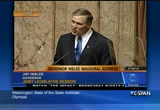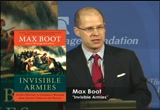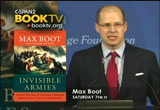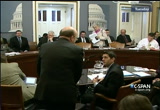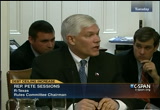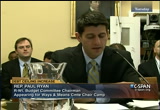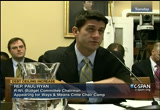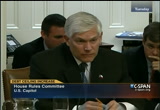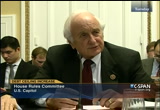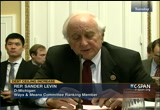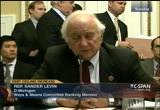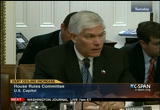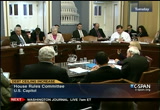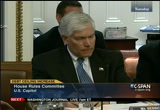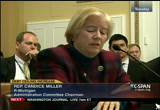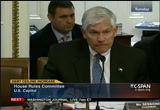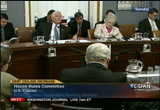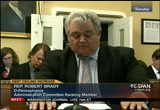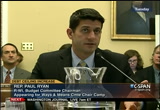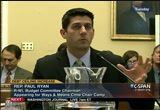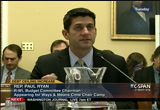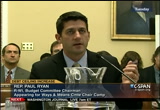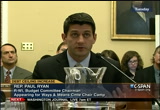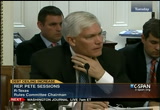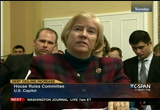tv Capitol Hill Hearings CSPAN January 23, 2013 1:00am-6:00am EST
1:00 am
once again, the house of representatives would be the people's house, and all the people sent to serve here will be able to participate in it. we long for that day. >> i appreciate that. i had a conversation with mr. cooper this morning which was we saw a democrat with a piece of legislation that we thought was a good idea. that's why this includes that legislation.e of the rest of usd about it. we would have -- >> ion't know what to say about that. >> there's not much we can say about it today. i'm sure you have the votes to pass it and it will go out of here ok. the strongest terms i can, the idea of continually coming up here and sitting here with something that was just handed to us and trying to pretend that we're part of the process here is -- i just can't do that any more. thank you very much. >> thank you very much.
1:01 am
in defense of me asking you three or four as it were to come up here, i'm delighted that we did this now rather than waiting until the very end because, mr. ryan, i don't even know -- and you don't have to respond to this -- but i don't know i just can't do that any more. thank you very much. >> thank you very much. in defense of me asking you three or four as it were to come up here, i'm delighted that we did this now rather than waiting until the very end because, mr. ryan, i don't even know -- and you don't have to respond to this -- but i don't know what day we have to have it ready. and so i viewed that as committee chairman, speaking with each other, including our republican leadership, that we were trying to do the correct thing and to make sure the administration read us as clear. this is not a poison pill. this would be something that the senate would have to agree to and public comments out of the senate by senate democrats have indicated the willingness to accept it. >> right.
1:02 am
that's one of the reasons we are doing it now because we don't want to bring it to brinksmanship. the statement of administration policies, snap, we use acronyms around here, we don't know what the x date is, meaning the date when the borrowing money is run out. it's estimated that that occurs sometime between february 15 and march 15, but we don't know whenwe don't want to test it. that's why we're doing this now. >> i applaud chairman camp and you and each of you for being here today. mr. cole. >> thank you, mr. chairman. i appreciate that. just one question to any of you that might care to take it up. i heard a number of people that constitutionality of the pay provisions. i know, mr. chairman, you looked into that but i invite either two gentlemen to comment ascan you elaborate on that a little bit, what kind of research you've done to ensure this is within the constitution? >> ok. i -- i will preface my statement by reminding you i am not a constitutional attorney. constitutional attorneys.
1:03 am
confidence. >> again, you know, james madison, obviously, proposing the 27th amendment, 1789, and i and they agree, our side, anyway, the attorneys agrees it applies to varying -- varying being the operative phrase -- of the compensation. it's interesting. they looked at a couple cites -- couple of lawsuits that have been before the supremes, about this issue. one was about the cola provisions that the congress automatically gets some increases, etc., and there was another one that was brought by a congressman, bob schaefer. some of you might recall him. it was before my time. on the grounds that -- let's see -- 27th amendment. anyway, i won't go through all the weeds on that. again, it spoke to the varying. they decided that varying the compensation is really the operative phrase, as i say, with that.
1:04 am
so our attorneys in the housed a minute, on our side, agree -- house admin, on our side, there is no -- as long as you pay members at the end -- i should say -- by the end of the 113th congress or obviously we would like to have this negated completely by having the senate pass a budget, the house pass a budget, senate pass a budget, as required by law and on time. so as i've talked to them, i feel pretty good about the constitutionality of the 27th amendment and how it applies to this. i would, if i could, make a couple other comments. i do think it's interesting in the spirit of bipartisanship, as you've pointed out, this was a piece of legislation for the most part pretty much mirrors what was introduced in the 112th with -- by a democrat with several other democratic co-sponsors as well as republicans here. i sort of feel like this is an
1:05 am
effort at a bipartisan -- bipartisanship. i know sandy had to leave. we were talking about the ratings agencies and what debate. reading the executive management report from the ratings agency that also pointed to the congress that one of the reasons -- huge reason for the downgrade, they didn't feel that the congress had the political will to address the spending crisis that we are in either. so that was also a big part of the downgrade of our credit rating. now i think, you know, we are trying to exercise the political will to address our spending by having a budget which you can't really talk about appropriation bills and all of these kinds of things in my mind having this saddam continuing resolutions to fund the government forever is unsustainable. you need to pass a budget to begin with a foundation.
1:06 am
>> mr. cole, i also talked to attorneys, our attorneys, some other attorneys, not just on our staff and i tell them, talk to me like i can understand you. because they talk too much legal lease. i ask them, if i get a paycheck in my account every month and i don't get that paycheck in my account, so whenever it may come, at the end of the year, that's varying. their opinion, that could be. they didn't say it was. they said it could be that could violate the 27th amendment because they're varyingnot coming this month. coming at the end of the year. the other thing i would like to -- don't understand -- and i want to tell you like i think and how it is. we are kind of like trying to not punish but penalize the other side. the senate. because they haven't acted. so what we're doing is drafting legislation that's going to make our side, whether we pass
1:07 am
or maybe sometimes not pass a budget, and we're going to punish, not punish. maybe penalize our side by not getting a payroll or paycheck until the end of the year. now i'm probably not -- i think i'm talking maybe by my own knowledge, i don't think it hurts any of the united states senators. but a mayor, one of our 435 members here, because some of them i know may have to make a mortgage payment, maybe have to make a car payment, maybe have to make an insurance payment or some type of payment. and they may not be able to talk to their bank or whoever they might be, can you wait until the end of the year? i can show you my escrowi'm probably thinking we'll pass a budget in the house, so maybe it might not happen to us. it may not bother the other side too much. that's my opinion. >> mr. ryan, do you have any thoughts on this?this is meant s back to doing its job, to simply
1:08 am
folling the law to budgeting. we have a fiscal crisis. we are racking up trillion- dollar deficits. this is not a republican against democrat thing. it's a math thing. this debt crisis is comingall od people for past behavior. this is meant to get congress back to doing its job, to simply following the law to budgeting. we have a fiscal crisis. we are racking up trillion- dollar deficits. this is not a republican against democrat thing. it's a math thing. this debt crisis is coming because of the debt that is piling up. all of the independent fiscal authorities tell us this. the rating agencies downgrade us because they think our political system is broken at an impasse. therefore, no solution is occurring. and our argument is the way to break that impasse is to start budgeting. the law says we should budget. we should follow the law. we have disagreements on how to budget.
1:09 am
but at least we ought to come to the table with each of our individuals and our plans. if you're ever going to get to a solution, what usually happens under what we call regular order is we pass our budget vision, the other side passes their budget vision, and then we bring ideas to the table and we start negotiating. that hasn't happened for four years because the senate has chosen not to even begin this process. and so we think we are advancing the goal of restoring fiscal discipline to our federal government by just getting senate, to begin to follow the budgeting law again to budget. hope this will result in getting a down payment on our debt to meet the obligations of our seniors, of our military, of the people who are living on the safety net, of the vulnerable, of the bond markets so we can keep interest rates low so we can make sure we don't hurt our economy. >> i want to command -- commend you on the effort of people to just put out a budget. with all due respect on my friends on the other side, last
1:10 am
year they were in majority, they chose not to do that. they chose thinking it would provide political cover. it didn't. i think that's what's gone "encore booknotes" the senate side. calculation that somehow this will spare some of our members from difficult votes. i commend you for developing a difficult budget and getting your colleagues to vote on it and it was a legitimate issue in the campaign. i think it's an appropriate place to have the discussion. you come, you vote, we go have a campaign. that helps the country clarify the issues. we move on. the house has fulfilled its responsibility in that regard in through the fire in the election. i think that's fair. the senate just simply has not. and it is discouraging. you know, it just takes 51 votes. that's all it takes over there. i actually heard commentators tell us, oh, no, it takes 60. it takes no such thing. it just takes 51 votes where the majority now has 55 and at one point had 59 and was unable to -- unwilling, i should say,
1:11 am
get 51 where you got over 228 of our members do last year which was actually vote on a budget going into an election year. mr. chairman, i'm delighted to see legs like this. i do think there are legitimate constitutional questions. i think those we'll have a vigorous discussion about that in the next couple of days. i'm comforted by some of the precedence you cite, mr. at the end of the day, this is about getting us to do our jobs. there isn't a member up here that wouldn't tell you it really is our obligation to write a budget. again, our friends in the
1:12 am
majority did not. i'm really happy to see the minority, they have chosen to do so. i think it's actually a very good thing. the minority, getting a budget and laying out there was good for us politically. i think our friends in the senate need to follow course. that will clarify the issues. i think it will help us avoid future debt ceiling crises if we know we got some manageable plan and each side has staked out a commonality, no doubt,nd i think we'll move forward. you know, until the senate actually gets in the game i happen and i do think that's people. i commend you very much. balance of my time. >> thank you very much, mr.>> thank you, mr. chairman. mr. chairman, you talked at the very beginning of your remarks about a deliberate tif process, how important that was. and mr. ryan talked about regular order. we're all for that, but we're beginning not with a deliberative process and this is not regular order. this is not the product of a deliberation in the ways and means committee and hearings and markups. this really is kind of a back room deal that -- i first read about it when you were on your retreat. so we begin on that note, and i
1:13 am
think one way to avoid that characterization would be to agree to what mr. brady asked for is an open rule. i'd ask both of you, mrs. miller, mr. ryan, whether or not you would favor an open rule here so we can have a deliberative process so that, you know, members who quite frankly haven't even read this yet because of, again, yesterday when you dropped it in, it was inauguration day, martin luther king's birthday. there are questions about constitutionality that people who are not constitutional experts are trying to grabble with. so would you be in favor of bringing this to the floor under an open rule tomorrow? >> as a fellow chairman, i'll defer to this chairman. i don't want to tell mr. chairman how to run his committee because a lot of times there are other issues that you just don't know about to take into consideration. >> does -- do you have an opinion on whether this should be an open or closed rule? >> i also will defer to your rules committee to debate
1:14 am
afterward. that's why you have this committee. >> i'm not particularly surprised by your answer. but i think it's an important point to make. and the other thing is, you know, -- you know, i'm as frustrated with the united states senate as anybody on this committee. but i think it is a little bit disingenuous to say, lay the entire blame for where we are at the feet of the united states senate. over the last year when speaker boehner and the president were close to an agreement, the speaker walked away because members in your own conference did not want to compromise. it would have been better to approach this in a bipartisan
1:15 am
way. to engage in leadership of your party and i engage our leadership to go through a committee process, where you did have a bipartisan -- you mentioned this was mr. cooper's idea. i looked up the bill, the bill you are basing this on and mr. cooper didn't mention the debt ceiling and another bill, said if we default on our debts, congressional pay is the last thing that gets resolved. so this is different than that. i go on record, i don't believe we should be politicizing and happy we aren't going to default immediately because we are going to kick the can down the road. but i'm tired by governing by
1:16 am
1:17 am
today and two that agree with each other and two that disagree. >> we are still in a transition out here? >> let me do this quickly, just in the short time we have been here, presuppositions of what we will or will not do. we haven't done a budget yet for this year. >> that's correct. >> this doesn't presuppose the budget or whether or not the senate will or will not. it says there has to be a budget and in order to do that - there is no pre supposition of what that budget will be. >> that's right.
1:18 am
>> we just think it is doing our job. when i grew up, i had odd jobs. >> when i was an accounting, mowed lawns, i got paid. if i didn't do the work, i didn't get paid. if you work, you get paid. now, we have constitutional issues. >> more important issue. after i wrote three more letters that came in over the weekend, i get my pay for life. however, for the record, the key issue is this says we get a budget and doesn't presuppose what that budget is and i yield back. >> thank you, mr. bishop. two other points, one, we don't
1:19 am
know when the actual date is. they are here to push a bill early enough thatwe presuppose the work that needs to be done so we can work at this also, because we place on the senate the same thing we place ourselves, a responsibility to get this done and as mr. ryan has said he will produce that budget accordingly. >> thank you very much. i thank all of our witnesses >> our friends and colleagues must be amused by this exercise. the 113th congress is starting
1:20 am
with the way the 112th congress ended. during the summer, i made the comment that if kicking the can down the road, which is what we're doing, was an olympic sport, then the united states congress, and by that i meant the senate and the house would win gold, silver, bronze and aluminum, because we have this habit of kicking the can down the road. the republican philosophy seems to be, why do now what we can do later and why do later what we can even do later. this isn't no way to address our fiscal challenges and no way to rule the economy.
1:21 am
you lost a lot either in the koch brothers and the tea party group they fund has come out against using the debt ceiling as leverage rather than holding it hostage. and yet the republican congress is still in turmoil over whether this is the right thing to do. i was fascinated by mrs. -- it avoids my friends on the other side from having to coordinate with the treasury department. i was fascinated by mrs. miller's miller's comments regarding the escrow and whether or not interest would be undertaken. i was looking at the 401k maneuver for $150 billion taken
1:22 am
out of the 401k plan of congress and the federal employees. and the first thing that came to my mind is, if you are going to take $150 billion out and i don't have many money over there, but you don't get interest. it ain't but a nickel, but a penny and somehow or another that seems to be a problem here as well. but being out of sight doesn't mean being out of mind. and the republicans can't will away our national responsibilities just because it conflicts with the ideology of your more extreme members. i imagine come may, my friends on the other side will find another loophole that allows
1:23 am
them to pay off the debt ceiling for another three months. we emerge from almost crisis to almost crisis through the next year while at the same time you notorious on the other side for complaining that the problem with our economy is uncertainty. i have heard that many times than a little bit both here in this institution and in the rules committee and those that were on the political trail. threatening to fulfill our national obligations is a serious breach of economic uncertainty. but republicans seem to be attracted to this kind of dangerous gimmicks to act seriously to act on the full faith and credit of the united states. until they do, i suspect that we'll have a lot more meetings on this very issue.
1:24 am
now as a lawyer, not a constitutional scholar, having made a lot of decisions about constitutionality as a federal judge and when i went on the bench, i was accused of being a judicial activist. and i was thrown off the bench. i was accused of being a judicial activist. and i guess that's compared to strict constructionist. and if there was ever a case, the 27th amendment was not ultimately ratified until 1999. james madison proposed it in 1789 and 39 states eventually ratified.
1:25 am
and 1992 is not just so long ago, so it's real easy to read, it says no law, no law, with a comma varying and this is where mr. brady must have tagged the word varying the compensation for the senators and representatives shall take effect until a election of representatives shall have intervened. we just got over one and we can't do nothing until we have another one, if you read it as strict construction. but no law. now we have had some cases -- we had boehner versus anderson, district court of appeals case where we were talking about the cost of living adjustment under
1:26 am
the ethics provision. there was another case -- >> yield for one moment, please. the gentleman is expected to address our conference at 4:00. i would like to ask unanimous consent that as we allow him to leave -- i wanted to give you a chance before i excuse chairman ryan if you have a question for him. >> i will talk to paul about my question. >> the gentleman, mr. ryan, is excused. the gentlewoman would also like to take that opportunity. >> [indiscernible] [laughter]
1:27 am
>> we may or may not want to have that debate. the gentlewoman seeks to be excused and i would allow based on unanimous consent to do that. the gentleman which is to leave on his own, i would understand that. the gentleman would be excused. thank you for being here. >> thank you. >> i would like to say if we look at federal opinions for added instruction, the shape of the content in the 1992 case, there has been the supreme court opinion with reference to this varying business and all of
1:28 am
the federal law seems to deal with the cost of living increase. what they propose is, first off, if i take paul ryan's comment that it will cause them to not be paid for not working, that makes an absolutely dumb assertion and assumption that the senate does not work. it is dysfunctional, but they go to work. we will withhold their pay because they have not had a budget? then i guess we will withhold their pay because there are 95 federal -- in this country that are not undertaken. i guess all the work they have been doing trying to confirm the president's appointees is not work. then the thing that goes ignored is how powerful any one senator is.
1:29 am
they can hold up anything. all we are doing, we are kicking this can metaphorically. it's disappointing, mr. chairman, that there was no hearing on this measure. there was a comment that we would be transparent and do these things and not backroom deals, well this is a back room deal. it came from somewhere. it did not come from the committee structure. it did not come from what we referred to as regular order. now we will do this on a closed rule. when i came here, i was surprised how much republicans are on radio at that time arguing about democrats not allowing for open rules.
1:30 am
democrats and republicans since that time have done the same thing. at some point, we have to let the congress work at its will. until we do that and stop playing games, we are dealing with this nation. we should not be tying our debt ceiling to an ideological concept about budgets that everybody knows and all of us has had a hand in for political purposes at some time. thank you. >> i might also note about half this congress is two terms or less. we listen to our members who want to have a chance to make sure we did look at the budget moving floor. we were listening to a number
1:31 am
of our members and believe before we have to act that we know what we are doing and offer the same challenge to ourselves. >> may i ask you a question? have you ever voted for a continuing resolution? >> i have. >> we all do it. >> the same opportunity exists for anybody who votes as they will choose. the gentleman is recognized. >> thank you. i agree with my colleague from florida. the time for game playing is long past. i would tell him we are in a crisis and the chairman of budget committee, we are still here. the last cycle with the economist from the left and the economist from the right. economist from the left says you are two years away from a serious debt crisis and the
1:32 am
congressman from the left said it was five years away but it was a most certain reckoning of fiscal policies for both parties from decade to decade. i tell you, i am as much of a fan of open rules as anybody. i am proud of this committee brought them back for appropriation bills. i hope that is a tradition the chairman will continue. i am sure he will. but this back room deal is the one that the ranking member introduced and the president said he would not oppose hr-35. the same one the senator and majority leader harry reid praise the house for taking up and moving forward.
1:33 am
this budget issue is a serious challenge. go back and look at what we did in the budget control act, august 2011. 95 democrats voted yes and 95 voted no. it was about as bipartisan a bill as folks could have come up with. it made a real turn in the spending curbs. i was proud to support that bill. we can either try to jam something through in 3.5 weeks. we do not have the votes on our side to pass a debt ceiling that does nothing about the real problem, nothing to deal with the real crisis, the certain crisis. it is an irresponsible thing to do, to kick that can down the road. what we have been able to do is to say, let's give ourselves four months for a serious budget cycle, with the senate says they want to pass a budget
1:34 am
for the first time in four years, and see where our priorities are, our values are, and we can come tog# sad our wit us, but i am glad they were able to testify to the opportunities this provides. you look for those numbers of things the president agrees on, the senate agree on, and the house agrees on, they are few and far between. i hope this is ceasedsion about i am sad our witnesses have left us, but i am glad they were able to testify to the opportunities this provides. you look for those numbers of things the president agrees on, the senate agrees on, and the house agrees on, they are few and far between. i hope this is ceased to mark. >> there has been discussion about why we are here at this time. i chose that we could probably take a gamble or a risk and no some of our members may have toi apologize.
1:35 am
they will be representing themselves to their appropriate bodies. i think you, gentlemen. >> i do appreciate you did not have this at midnight to talk about this issue. [laughter] >> it was a passing consideration. [laughter] >> i think members on both side of the aisle appreciate that. my good friend from georgia mentioned it, but the debt crisis that we have, both sides agree to it. when we start talking about how you actually resolved it, those on the left said we need to raise taxes. they got partially what they wanted when the tax went up on individuals. they got part of what they wanted. the other part is really, truly
1:36 am
spending reduction. i know the present not -- the president does not agree. but we do. when those agencies talked about our underpining as it relates to our overall health of our economy, he talked about congress's in the bill -- inability to do two things. raise revenue. the other was to get our spending under control. while this does not do it and i agree this body, and it is not just in recent history, but over the years, this body has kicked the can down the road. we are adding trillions of dollars of debt as we move lower.
1:37 am
while this is a small movement, and it does not sound like much to get some to actually do it, and i know they are supposed to do a budget by law, but it was in the lot and there was no slap if you did not get it done. you are on will people and you do what the law requires. this is just saying to them, do your job. do your job. i do not know what the constitutional implications are. at the end of the day, if you look at the reason why this amendment was first put in place, it was because they did not want members of congress getting elected and getting a pay increase. that was the intent. they postponed it, that you could vote for a pay increase, but it would not go into effect until the next congress. as we move forward, it is about getting the senate to get off
1:38 am
their duff. i appreciate all of our members who spoke today. >> when i had the wonderful duty a few years ago, i recognized it was an opportunity to engage administration, whether you agree or disagree, to give them an opportunity to hear congress about what we the people would be interested in funding, holding them accountable, giving them a chance to talk to us about the needs they saw and to make sure we had a two-way dialogue. it is a real live document that our government needs if they
1:39 am
were going to effectively work under the law with an understanding about what they were to produce and what results they had. i agree how important this is and our work today. that is why we are taking this time to do this. >> the ranking member brought the concept that she was glad to speak and the cuts were left out of this. i am disappointed the dollar for dollar cuts were not up part of this. i understand the reason it was left out. i do have concerns about the fact that the debt limit was suspended. i hope that can be addressed in the next several hours before we vote on this legislation.
1:40 am
i understand this is one step of a four-step process. i intend to support the legislation as it goes forward. i yield back. >> thank you. seeing that we have no further witnesses there before the committee on this issue, without objective, this portion of this meeting is now closed. the chair will now be receiving a motion. >> thank you. i move the committee grant hr- 325 until may 19, 2013. the rule provides one hour debate equally dividing and control of the chair ranking minority members of the committee from ways and means and 20 minutes of equally divided control from the chair ranking minority member of the committee on house administration. the rule provides the
1:41 am
amendments printed and the rules committee report shall be considered as adopted and the bill recommended shall be considered as read. the rule is against provisions in the bill amended. finally, one motion to recommit with or without instructions. >> i thank the gentlewoman. is there any discussion? >> all members have the opportunity to rule on the floor. i do that in the spirit of the conversation we have had here today. and also the conversation we have had here today that most members of the house have been shut out. given the opportunity to express themselves more about how they feel about the matter, i really urge we consider an open rule, with something as important as this. thank you.
1:42 am
>> any further discussion? i would offer some bit of content that this is standard closed rule. its provides for one hour general debate. we will move it to the floor. we will allow the committee a chance to debate this. as the gentlewoman knows, this has a wide range of effects. i know the gentlewoman knows. this is a first step in what could be a longer process.
1:43 am
1:45 am
i will be handling this for the majority. >> i want to notify the committee that we do not expect any other meeting this week. with that being said, i want to thank the committee and the staff for their time today. i recognize there are a lot of things today. this hearing is closed. >> coming up, the house ways and means committee hears from former imf economist on why the debt ceiling debate should be separate from the debt and deficit talks. then members of the house speak about the anniversary of the supreme court ruling legalizing abortion. later, senator john mccain, ranking member of the armed services committee, joins a bipartisan group of senators suggesting changes in dealing with the syrian civil war. >> coming up on "washington
1:46 am
journal," the freshman democrat from nevada will discuss his first war priorities and issues before the congress, including spending, immigration, and gun control. he is all about congressman lee terry, republican from nebraska. he will be here to talk about the decision by a state governor to approve the rerouting of the keystone pipeline through his state and the potential economic impact. that is like 7:00 a.m. eastern every day on c-span. >> c-span, created by america's cable companies in 1979, brought to you as a public service by your television provider. >> former imf chief economist said tuesday that the debt ceiling debate and debt and deficit talks should be separate. mr. johnson testified before the
1:47 am
house and the ways and means committee on a panel that included the former staff director of the senate budget committee. this is two hours, 10 minutes. >> in the audience, take a seat. we are expecting votes, so we will get started. the chairman is on his way and he will be landing in a couple minutes, but we will get started. good afternoon. welcome to the hearing on the debt limit. he asked we go ahead and start the hearing so members will have as much time as possible with our distinguished
1:48 am
witnesses. i will read the statements. then i will turn it over for the usual opening statement. good afternoon and thank you for joining us today, all of you. the topic of today's hearing is the debt limit. since the president took office in 2009, there have been four increases in the debt limit, totaling over $5 trillion, a 55% increase. as of december 31, 2012, our nation reached a current debt limit of nearly $16.40 trillion and the treasury department has been using extraordinary measures to avoid succeeding the debt limit. those measures will be exhausted between february and march.
1:49 am
in the simplest of terms, the limit helps hold washington accountable to hard-working taxpayers who ultimately foot the bill for the spending habits. without a limit, washington would be as free to borrow as much as they wanted. as i said many times before, no one party is solely to blame. during eight years of the previous bush presidency, the deficit increased by $2.30 billion. president had twice as much during his first term. it has an impact on american families. during the president's fiscal commission, we heard non- partisan testimony that stated when the debt is this large in
1:50 am
comparison to the economy, it costs the country the equivalent of about 1 million jobs. think about that. if washington got its debt spending under control, 1 million more americans would be working today. as if that was not sobering enough, the staggering size of our debt and lagging plans to deal with that also threaten interest rates. the agency recently warned the failure to make progress on our structural debt would likely still result in a downgrade of the u.s. credit rating, a lower credit rating is sure to mean higher interest rates. which means families will face higher credit-card payments, student loan payments, and mortgage payments. in 2006, when speaking in opposition to increasing the debt limit, the senator obama said the fact that we are here today to debate raising
1:51 am
america's debt limit is a sign of leadership failure. those comments hold true today. that is why it is disappointing that the president is declining to engage in a meaningful dialogue to identify a responsible, balanced approach to reduce spending. and, reducing the deficit, which the president promised to cut in half during his first term. of course, it is tough to cut the deficit when the senate, controlled by the president's own party, will not or cannot even produce a budget. it has been four years since the democrat-controlled senate has passed a budget. that is a disgrace. i fully expect republicans and democrats will disagree about what the budget should look like, even when one party has a majority in both the senate and house, the two parties often disagree.
1:52 am
the failure to resolve the differences is the problem. how can we even start to find common ground if senate democrats will not tell us where they stand? in the first place, having the house and senate passed the budget is the first step toward getting our finances back in shape. i want to think the witnesses for agreeing to testify today and sharing your expertise on the debt, the debt limit, and what it means for the country. i thank you for being here. i would like to welcome and thank our witnesses for appearing before us. before hearing from them, i recognize the ranking member for his opening speech. >> thank you. welcome to all four of you. today's hearing appears to have been originally designed to give the veneer of credibility to the notion that it might be appropriate, thinkable, or
1:53 am
manageable, to default on our debt. it is none of these. the debt ceiling is about paying the bills of the united states of america. the spending that this institution authorized, manipulating today, next week, or in three or four months, damages our economy and our credibility. in the summer of 2011, and i urge we all try to remember it, republicans in this congress pushed our nation toward default. there were clear consequences, clear consequences. today, they are prolonging and other debt ceiling showdown instead of a long-term extension. this continues and increases the economic uncertainty. our nation's economic wounds
1:54 am
from 18 months ago are simply too fresh to ignore. august 2011 was the single worst month for job creation in the last three years. the dow jones slumped 2000 points in july and august of 2011, including one of its worst single-day drops in history. tumbling 635 points on aug.. the treasury was forced to spend $1.30 billion more in interest payments according to gao. the higher cost will be almost $19 billion over the next decade. of course, who could forget the u.s. credit rating was downgraded for the first time
1:55 am
in our history? one senior director said shortly after the credit agency downgraded the rating, that the stability and effectiveness of american political institutions or undermined by the fact, "the people in the political arena were even talking about a potential default." "the washington post" stated, "in 2011, the debt ceiling dispute traumatized the economy." a senior economist was one of the many economists who has warned against the repeat. he wrote in a report last week, and again i quote, "if political bickering over the debt issue reaches as it did in the summer of 2011, then
1:56 am
consumer confidence will dive further into recession territory." we are hearing today that there may be other options. some seem to suggest it might be possible to obstruct treasury to pay bondholders while delaying payment to others. whose bills should be delayed or cut? the social security checks of 56 million seniors and people with disabilities, the salaries of more than 2 million american personnel, many of whom are currently in harm's way? the idea is so troubling that a strong -- it drew a strong
1:57 am
rebuke from the fact checker last week. he said, "by available evidence, it appears all but impossible for picking and choosing of payments." he cautioned his colleagues last week that such an approach is unworkable. i also urge, and i went back and check it, that it embellishes history to imply that threatening to default has historically been used for leverage for deficit reduction such as with whom i voted for. in the house in both cases, the debt ceiling bill was being passed and the senate used it as a vehicle, not as a threat, for deficit reduction legislation. over the past two years, we
1:58 am
have achieved $2.50 trillion in deficit reduction. we set an important precedent that includes both spending cuts and new revenue. i close it firmly urging we should proceed with this effort, focusing further, not damaging the effort by attempting to use the debt ceiling for political leverage. thank you, mr. chairman. >> thank you, mr. levin. it is my pleasure to welcome the witnesses today appeared we have four witnesses on today's panel. we will first hear from lee casey.
1:59 am
he is a former official in the office of legal counsel. second, we will welcome william hoagland. he is also the former director of budget and appropriations for the senate majority leader and former staff director of the senate budget committee. third on the panel is dr. j.d. foster, the senior fellow in the economics of fiscal policy at the heritage foundation. finally, we will hear from dr. simon johnson, the professor of entrepreneurship at the massachusetts institute of technology your written statements will be made part of the formal record.
2:00 am
2:01 am
i would like to address the more fundamental constitutional questions of whether there must be a congressionally mandated limit to federal borrowing, and the extent to which the president may ignore these restraints or simply raise that limit and borrow money on his own authority. i believe that the answer is clear. under the constitution, congress alone has the power to decide how, when and why federal spending should take place, and the extent to which that spending may be supported by taxation and or borrowing. the debt limit or ceiling is, of course, a statutory device that dates to the first world war. although the debt limit in its current form is not constitutionally mandated, some type of congressionally controlled limit on executive branch borrowing is required and, whatever precise form that limitation takes, it is constitutionally protected.
2:02 am
the president can neither ignore nor alter the debt limit without fundamentally subverting the constitution's separation of powers and violating his own oath of office. there are two principal mechanisms by which the federal government may obtain the resources it needs to operate -- through taxation and through borrowing. both of these mechanisms are the peculiar province of the legislative branch. congress alone is granted the authority to lay and collect taxes, to pay federal debts, and to borrow money on the credit of the united states. the executive branch then carries out these functions. that is, its role is to execute what congress has enacted in these areas. the president has no independent authority to raise taxes or to borrow on the nation's credit. this was, of course, the purpose and intent of the constitution's framers. in a basic division of governmental power, they gave congress the power of the purse, a grant they viewed as especially empowering the house, where all revenue bills must originate. moreover, as james madison explained in federalist number 58, the framers fully anticipated and intended that congressional power over federal taxation, borrowing and spending would be used as a political weapon. i quote -- "this power over the purse may, in fact, be regarded as the most complete and effectual weapon with which any constitution can arm the immediate representatives of the people, for obtaining a redress of every grievance, and for carrying into effect every just and salutary measure."
2:03 am
it follows, of course, that the president cannot "raise the debt ceiling" on his own authority and is bound to respect this limitation on federal spending, even if this requires him to make difficult decisions and take actions he would not otherwise support. claims that section 4 of the 14th amendment grants the president such power are mistaken. section 4 forbids repudiation of federal debts lawfully incurred. permitting the president to raise the debt ceiling on his own authority would upset the constitution's basic separation of powers and it is also plainly inconsistent with that amendment's language. "the congress shall have power to enforce, by appropriate legislation, the provisions of this article." it is also important to understand that the public debt guaranteed by section 4 does not include ordinary federal spending programs, but extends only to debt instruments issued in exchange for money on the credit of the united states.
2:04 am
thus, as a constitutional matter, congress has the authority and obligation to regulate federal borrowing. it can exercise this power in a number of different ways, including by voting on individual debt issues as was the case before the first world war, or by establishing an overall limit on the amount of debt the federal government may incur without further congressional action. the president is bound by such limits. he can neither ignore the debt ceiling, nor can he "raise" it on his own authority. i would be pleased to answer any questions. thank you. >> thank you. i appreciate your comments. >> thank you. it is a privilege for me to be here. fundamentally, the debt ceiling discussion emerges from the most basic tenet of legislative sovereignty -- the power of the purse. i began my career here in 1975. later, i witnessed and participated in many project standoffs.
2:05 am
one of the most memorable was in 1985. that legislation came about because of the need to raise the statutory debt limit over $2 trillion for the first time in the country's history. as the country's debt has continued to increase, the need to legislate an increase has been more frequent and more difficult. i estimate the debt held by the public will continue to rise, reaching 77% of gdp by 2022. my statement addresses two issues. first is the x-date, the date at which extraordinary measures will be run out and there is insufficient cash to pay our bills.
2:06 am
the second, what options are available when that x-date is reached? on the first question, the cash closed on the first week. we have been with no large fluctuations. we base our estimates on known cash flows and scheduled payments during this time period, and on previous years, patterns of payments. at this point, we project of the windows of the date, between february 15 and march. on the second issue, what actions might the treasury taken post x-date? officials will face two potential scenarios. the treasury could prioritize payments. in 1985, there was a letter including the secretary treasury does have the authority to choose the order at which to
2:07 am
pay obligations in the united states. i asked the general council last week if this opinion had changed. they have not issued an opinion on this question since 1985. it stands. while priority may be legal, it may not be practical. 5 million payments on each business day. the treasury's computer systems are set up to process all payments as they come. it would be a dramatic overhaul and extremely difficult. further, should congress take to itself the responsibility of setting payment dates, possibly having to overturn the payment
2:08 am
act, and other existing laws, one must be realistic as to how long a legislative date would last. the second scenario, the secretary could instead announce the government will make payments on daily obligations but in the order in which they come due on a delayed schedule. assuming as we do that the x- date is february 15, the treasury enters that date with precisely enough cash to fund the $30 billion interest payment due that day. other payments are prioritized and paid on time. in this situation, there will be $22 billion of non-interest payments owed on february 15. they would be delayed until
2:09 am
february 20. over $30 billion of payments due on february 20, which includes social security benefits, would be delayed until february 25. payments due on march 1, would be delayed until the 15th. the government could face legal challenges, not to mention the real impact on individuals and businesses across the country. under normal conditions, the treasury issues new debt to the public in the order to raise cash to pay off outstanding securities as they mature. however, in a situation where treasury has begun to delay payments on non-interest obligations, there is a possibility such auctions will be disruptive. investors might demand a significant premium. it would force treasury to step in with enough cash to pay off redeeming law holders and pay default on the u.s. debt and would further delay non- interest obligations, a vicious circle. we would expect over $500 billion of debt needing to be rolled over from february 15 to march 15. in conclusion, it is strongly believed the imbalance in our federal budget register does need to be addressed. risks are risks and while no one can know for sure what ramifications it would have,
2:10 am
those risks grow day by day and could become catastrophic. these are consideration that i know members of this committee will keep in mind as you deliberate this important issue. >> thank you, sir. >> good afternoon. it is nice to be back. my name is j.d. foster. the views i express are my own. mr. chairman, we find ourselves in dire straits. the president's position on the debt ceiling can be summed up as kick the can and we will have a conversation. the senate's position is hoping
2:11 am
not to be noticed. so it falls, as it often does, on the house to lead. on the debt sealing we face three options, two drastic and one is sound. first, congress can leave the debt sealing in place. perhaps temping to some and understandably sew we all know this is unwise and irresponsible with consequences with we can only begin to image. consequences does not include defaulting on the debt the president frequently comments on. second, the congress can increase the debt ceiling. raising it substantial and doing nothing else could sustain irresponsible with no
2:12 am
end in sight. to be sure the date of onset of consequences are uncertain which makes this course so unappealing. the federal government's debt trajectory is dangerous, dangerous to our economy, dangerous to our future as a nation. surely, that at least, we can all agree on. it means that all of the resources will be crowded out
2:13 am
making less resources available for other priorities. americans generally are willing to pay taxes but they expect services in return. servicing the government's debt is not what they have in mind. it also means that saving, that would be available for productive investment in the private sector is captured by the government. soaring public debt means that when interest rates begin to rise they will rise faster and farther. the consequences of the interest
2:14 am
rates will be the most terrible of them all, for businesses and the economy and then there won't be anything that congress can do to stop them. they should raise the debt ceiling why enacting spending reforms, especially to entitlements in the short-run and the long-run. there are bipartisan, common sense solutions. it is possible through reform to remedy key failings, such as the benefit and social security and lack of benefit in medicare while doze thing reforms. our mantra should be reform and improve while slowing the growth of spending. if the president led on these issues he should help shame their effectiveness and transform himself from the most fiscally responsible president to the most fiscally responsible president in history. modern history provides fertile ground for doubt when solutions substitute for concrete decisions. i have my call s but i understand the difficulties that that house faces and i accept sincere that there are strategies that can fix this. congress must return to the regular order in a budget process, however, much the other body would like to do other wise. the house is correct to press for regular disciplined budget process. i don't know whether the house can compel the changing course. for all our sakes and my children and yours i hope you succeed. i know the house can take a stand to present the american people a clear alternative to a soaring debt. to choose to stand with debt in decline were to stand with the economic prosperity of future generations of americans. the american people deserve to know this much from the united states house of representatives where the nation is heading and
2:15 am
what the house will do differently. thank you, mr. chairman. >> thank you, dr. foster. professor johnson, you're recognized for five minutes. >> thank you very much, mr. chairman. i find it frightening and also hard to believe that we're having this conversation in general and you're having the hearing on this matter. among of the things i'm a former chief economist and i would remind you that the united states is not just the center of the world's economy our financial asset, our government debt serves a lynch pen. in 1948 and 1968 foreigners held as reserves about u.s. government debt about 2% of the g.d.p. their rainy day funds are now at least 15% of our g.d.p.
2:16 am
these are assets they hold willingly. they hold them because this in the past has been regarded as the world's safest asset. you are calling this into question when you raise the issue of not increasing the debt ceiling. to the world -- to the world's investors it is unbelievable that you would have this conversation. can i show the first slide? i testified before this committee and i made these exact same points in the summer of 2011. the point i tried to communicate to you then, if you continue to have a confrontation around the debt ceiling, you would create an unprecedented level of uncertainty regarding economic policy in the united states. this chart has taken from the work of professors baker, bloom, and davis. the full reference is in my written testimony. what did they find? what do you see in this chart? matching exactly with what mr. levins said in the beginning. all of this 2011 stands out as the moment since 1985 when we had the greatest uncertainty, the most lack of clarity for everyone. not just the government but everyone in the private sector, businesses, and consumers can't make decision physician they don't know what is going to happen to the government debt. listening to the testimony just now, i was frightened by the
2:17 am
extent to which leading experts disagree or vary in opinions with regard to exactly what may happen if we breach or come up against or somehow play with the debt ceiling. the u.s. has never threatened to default, not since 1780's. that has been the key element of u.s. fiscal policy since the constitutional convention in philadelphia. that is a lesson that president madison learned the hard way in and after the war of 1812. the importance of being very careful with your public debt and all communications around your public debt management. if you don't raise the debt
2:18 am
ceiling or if you postpone this confrontation, if you say every 60, 90 days we're going have the same kind of conversation about the debt ceiling you will continue to have this sort of spike. you will continue to undermine the private sector. you will continue to delay investment. and you will continue to reduce employment to what it would be otherwise. i urge you, i understand you have many difficult conversations to have. i appreciate that. i urge you take the debt ceiling off the table. do it for our sakes. do it for the world economy. do fit for global fm system that still has not recovered from the problems of 2007, 2008. if you want to stabilize the european economy, if you want to put pressure on the those who are struggling, then you should have this confrontation, pushing up the yield around risk assets around the world. you don't want to do that. you don't want to destabilize europe. you don't want another downgrade of u.s. debt. you don't want another spike in u.s. uncertainty. please, take the debt ceiling completely off the table. thank you.
2:19 am
>> thank you, sir. we've got a vote going on right now and it appears to me we're not going to be able to continue as we are. so i think we'll recess until the vote is over. they say it will be about a half an hour and return. the meeting stands in recess. >> mr. chairman, let me mention. there's going to be rules
2:20 am
committee on the bill so i may not be here for the questioning. i think my colleagues will be pressing the issue of a three- month delay and a potential harm it can do. we went through this once, dr. johnson, i remember your testimony so well. and to think of going through it again, my hope is that there will be questions that can elicit on why we should not play with fire once again. thank you.
2:22 am
2:23 am
you're recognized for five minutes. >> thank you, mr. chairman and thank you to all those who are here for your testimony it is very helpful. america will pay its debt that has been made clear by republicans and democrats in congress. we always have and i hope that -- those who choose to be melodramatic about it these days to gain political advantage if you could please stop. that would be helpful. secondly, there is -- i see no chance that the president's request to have a permanent, unlimited debt ceiling will occur. this is the constitution of the
2:24 am
house and the senate. as we've seen in the past it has been a helpful tool not only on checks and balances but to enact spending reforms and restraints. it can be helpful, but in my view, it has not been as helpful as it has in the past. the claim we heard earlier today that the extension of the debt limit may raise our debt limit cost that. that is highly speculative. the study showed mix results. three out of every five had no impact. the 2012 report was based on one event. to it inconclusive. the bipartisan estimates are
2:25 am
based upon both of these questionable g.o.'s and they miss the point. unsustained spending over time without doubt will raise the cost in america. that is why we're all here to deal with this issue. i would like to ask dr. foster a question because it relates to the debt ceiling. many of us see the other side of that coin as a credit downgrade, a second one, which has serious consequences, not just for our borrowing but for small businesses and consumers at home. my question to you, i know there are different opinions, but what do you think congress has to do? what steps should we create, not just medium consolidation, but long-term dealing with our long-term drivers of debt and
2:26 am
spending? what do we need to do to avoid a second downgrade? >> to avoid another downgrade, which on our current path is almost assured? we need to do two things and they are pointed out in the letter expressing the first down grate. one, don't raise any question about not raising the debt ceiling, unfortunately we have to do that. we have to get our long-term fiscal house in order. that means we need tow get the entitlement programs under control. to make sure they achieve the result attended, which is protecting the widespread population. there are simple entitlement reforms that are straight
2:27 am
forward that this congress could adopt quickly, they are not legislatively complex. these are the kind of reforms that received bipartisan in the past. they are common sense things. it is frustrating that we don't take them more seriously and move on them because they have profound impacts in the long run. yes, we have a serious problem with a $1 trillion budget deficit but as large as that is, that problem is dwarfed by the long-run entitlement programs. there are some reforms that will go a long way to get social security and medicare under control. that's where congress should be looking as we debate fiscal policy this year. >> do you think investors look beyond that debt ceiling to focus fundamentals you talked about? asking the question that america is looking to get the fiscal house in order? do you think that creates the most uncertainty going forward? >> it is a tremendous source of uncertainty. there are others but that is a major source that credit markets look at as indicated by the letter transmitting that the credit rating downgrade the last time. >> thank you, mr. chairman. i yield back. >> thank you and welcome back, mr. chairman. i'm under the impression is the debt ceiling is to give authorities to ensure our creditors that each nickel that we borrow will be paid back. we also have to have guidelines
2:28 am
to share what creditors and americans alike, the fact that we're going to reduce unnecessary spending. having said that, there are some people believe we have to have this involved debt ceiling with the deficit and of course, that is controversial. under the system of prioritizing payments as some people are pushing forward, they would believe we can determine who we're going pay our interest to when we get a better handle on the spending part of this dilemma. i want to ask dr. johnson some questions. these programs that you pay interest on is the number one priority, i think every family would like to pay off interest. social security, and somewhere active duty military, and i think that is patriotic as well as political. under this scenario, dr. johnson, will we be paying the people we borrow from in china, the largest creditor, we will pay them before the military who got caught in korea fighting the chinese.
2:29 am
does this work out in terms of aborting the payment of our debt that we would pay off our debtors before we pay off our military? is that part of the plan? >> well, it is hard to know. i don't think these plans are very detailed, worked out, credible plans. they are vague notions, the one i've seen. i have seen the notion that the united states will pay its debt in the form of interest on bonds, a substantial fracture is held by the chinese, for
2:30 am
example. ahead of other payments, which include payments to active service military personnel, if example. >> it seems you owe anybody money, whether it is your country or your company err you're not give the executive director to authority that is already borrowed that should not make our lenders feel comfortable. but about the question of reducing spending, is there a vehicle that congress can exercise this ability without jeopardizing the reputation of credit? i mean, we have to deal with it but you say, and most people -- i think most people believe that don't attack the debt ceiling and the integrity of the united states of america but use the constitutional vehicles that
2:31 am
you have. what can congress do to express america's concern about spending? >> you have a wide range of tools and, in fact, you have more than 200 years of fiscal history that congress did exactly that. congress for many, many years had a reasonable tax base that was consistent with the spending they wanted. nobody put the debt ceiling or the u.s. willingness to pay its obligations on the table in the way it was placed in the summer of 2011 and the way i fear it is placed on the table again. it was a big mistake in 2011 to create this uncertainty and fear around the world and it is a big mistake to do it again today. >> what any good-thinking patriotic american want to use the debt ceiling as a vehicle to reduce spending? what would their reasoning be certainly not to embarrass the
2:32 am
united states of america? >> i have no idea. but i can tell you -- >> if you don't have any, maybe it is to defeat the objectives that this president, at whatever cost some so-call leaders have said. they want to stop this president and they were unsuccessful in that measure. maybe they decided to change tactics and maybe this discussion is unnecessary and we find some other way to get a hand on the deficit. let me thank you to your contribution to this conversation as you have so many times before. i yield back my time. >> thank you, mr. johnson is recognized. >> thank you, mr. chairman.
2:33 am
mr. foster, president eisenhower said "we can't mortgage the material assets of our grandchildren without risking the loss of their political and spiritual heritage. we want democracy to survive for all generations to come." in your testimony, you say that "a change of course is inevitable." the question is what kind of change? you warn one such change may be brought by credit markets increasingly intolerant of washington's indecisiveness. and say, the game is over. in other words, we're on borrowed time here, aren't we? >> yes, sir i'm afraid we are. this is rather an unusual place for americans to be in. we're not used to think in these terms. we've had a fair amount of debt it has ranged in the order of 40% of our economy, which is completely manageable. it has shot up dramatically and will continue to do so under current policies.
2:34 am
it is clear in international observations. there comes a point where your debt reaches levels where credit markets become disturbed and worried. it is expressed in rising interest rates, we're not just talking about treasury rates but mortgage rates and so forth. this is a certainty and it is the path we're on. it will have consequence that we're not used to thinking about in this country. >> i asked the question how much time do we have. when do you think we face our greece moment if we fail to take meaningful action to get our house in fiscal order? >> the good news is that despite all we've done wrong we're still one of the safest places to invest. there is a lot of places around the world that capital doesn't want to be. as we're raising debt rapidly it comes into. at some point that will reverse. when that will happen, i can't say. i don't know when, for example, europe i don't known when they will get their fiscal house in order. when they do, this will reverse. >> germany is making moves now. would your care to comment? >> i agree with dr. foster that we're probably the best looking horse in the glue factory today. that may not last.
2:35 am
i would also say that i'm very worried about that we're looking at debt to g.d.p. that is close to 7 %. in the past, we've had g.d.p. at that level we did not have 50% owned by foreign investors. we have to deal with this going forward. i agree that the real issue is mandatory spending and putting in procedures, processes, and building a pawn, a regular order process up here of getting budget resolutions adopted, reconciliation bill and working it through the regular order. that's why i would say while this is not the perfect solution in the three-month extension, it does put you back closer to what would have been a regular order process. i think that is positive. >> i want to know what you think if we don't get it in order to our small business owners to your young families, to our inspiring college students, what kind of future are we looking for these folks? >> i think the standard of living that we have experienced and enjoyed, we have to be honest that we are lessening
2:36 am
2:37 am
>> thank you. >> i have to tell you listening to this, it is like we're living in alice in wonder land. we're hearing from witnesses how to use default creatively or using it to get leverage. the simply talking about it here is destructive. the whole world is watching this hearing. this is the first hearing on this issue. the whole point of a society is
2:38 am
to create and run a government in order to make order for people. people don't like chaos. this hearing is about how to create chaos to get what you can't get politically with votes. the businesses and workers in my district think this is crazy. they were talking about a crisis manufactured by the republicans. a crisis they manufactured to achieve policies that voters wouldn't vote for. they are taking the economy hostage. there are thefts for
2:39 am
businesses, retirees, and growth stops every time there is a crisis. this is a republican government economic policy at work -- or not at work really. the biggest arguments before us is that spending and debt are the -- they are the problem. that is the problem. republican presidents were happy to run up huge deficits to wage wars they did not pay for or take tax cuts from individuals in the industry and give billions to oil companies. deficits are what the republicans care about. what republicans want to do is end the guaranteed on social security and medicare. we just heard someone say it is
2:40 am
the entitlement programs that are the problem. i disagree. i think this country can have a social safety net that covers people and have it paid for. that ought to be happening. what is happening on the other side of the aisle is they want everyone who is lucky and doing well, do well. if you're not doing well, it is your probable. it is survival of the fittest put in into policy. that is the republican policy. i respect they want a different policy than i do but we need to be honest about the debate. this is why spending into tv cameras again and again. spending is just the term that the polls like. republicans won't say what they want cut. the word spending polls very well so we hear a lot of it.
2:41 am
but we don't hear debate because the republicans want crisis but no solution. if we were serious about having a debate we would talk about what in medicare should be cut? how are we going to finance positions? all of those things would be on the table but we don't hear that. what we say is let's kurt. when you start talking across the board, you're talking about nasa and you're talking about these government agencies that they don't do anything that adds anything to the society.
2:42 am
when we're spending our time here talking about the deficit stuff and raising the deficit we are simply saying to the world, for the first time america is not going pay its debts. my question to you, mr. johnson is this, if this was such a good idea, why haven't we done it before? we could have saved a lot of money by not paying our debts. why did we suddenly decide this the s the time to do it? give me the understanding so the american people can understand after all of these years under the first world war i voted under president bush, both of them to raise the debt limit. but now we're going to stop paying. please tell me why they're doing this? >> congressman, it's not a good idea and it was not the way policy was run. go back to 1789, after the restructuring of debt which alexander hamilton began fiscal government in this country. it took a long time to convince the world that the u.s. was the safest place to put your reserve assets or your rainy day money. it was a great achievement but now it is being thrown away for what i presume some negotiating purposes which makes no sense. >> thank you. time has expired. i would like to place in a record a temporary suspension of the debt ceiling where the administration says for these reasons they would not oppose a short-term decrease in the debt
2:43 am
limit. so ordered. >> let me expand a little bit on his line of questioning and get a quick response from the four of you. back in 2006, speaking on the senate floor then senator obama announced he was going to vote no to the debt ceiling increase. he went on the say "i oppose the effort to increase the debt limit. we now depend on foreign countries to pay debt". since then, we now have a $16.4 trillion debt, nearly doubled in six years. in fact, since this president has become president in 2009, he has added more than four times -- more than $4 trillion -- more debt in four years, excuse me than the previous president did in eight. so the four of you, was the
2:44 am
president right? is this a failure of leadership and is there a better direction? >> well, i certainly think he was right that we shouldn't run the store based on borrowing. there's a lot of ways you can pay your debts an they don't always include -- >> since he made that speech it has gotten worse. he has done nothing to change the trajectory. is the president right, is it a leadership failure? >> i would grow with that. it is. >> congressman, i would be careful to point out that some of that increase in that debt that took place was a result of obligations that incurred long before he was ever president of the united states. >> all right. >> i just want to make sure. also i want to say the house passed budget resolution which
2:45 am
was going in the right direction to control spending. it still had a debt at end of the year of $1.7 trillion. it is getting worse. it is built into the pipeline. >> thank you. >> there is no question that allowing debt to continue to build more rapidly is reckless, it is irresponsible. on some circumstances it is inevitable. we should be getting it under control and do so quickly. >> mr. johnson? >> in my written testimony addresses this directly. this is figure two and you can see the impact of the tax cuts, the two foreign wars, the 2008 bush-tax cuts and the financial crisis. if you move to figure three it shows you that the swing to medium term debt projected before they realize the -- >> let me ask you a question. was the president right? yes or no? >> the president was right when he spoke about the reckless fiscal problems but he did not realize how bad it was going to get. >> so you're saying the
2:46 am
president is right today as well. even though the debt has doubled and we had a deficit that was on the decline with what you talked about. it was less than $200 billion, the year that rob portman was budget director. and it has gone over $4 trillion four years in a row. >> we lost huge amount of revenue -- >> we're not going to solve this. i have another question for mr. hoagland. i know you have experience on budget issues in the senate. when you worked in the senate did they pass budgets when you were there? how many times or did they fail to pass a budget one year, two years, maybe three years? >> i started in 1975. i left the senate after 2007. over the 33 years that we had budget resolutions, beginning in 1979. seven times have we failed to get a conference agreement on a budget resolution. unfortunately, over that 33 years three of those times have
2:47 am
are been in the last three years. there was one time when i was staff direct over senate budget committee that we did not get a concurrent resolution on the budget. one time. >> time has expired. >> mr. doggett. >> thank you, mr. chairman. has mr. johnson's chart demonstrates, when we concluded the clinton administration we had a surplus, for the first time in recent memory. a huge tax cut where alan greenspan sat and told us the justification was that we were reducing the debt too fast. we would create uncertainties in the bond market because we were moving so quickly. but a unpaid tax cut, two unpaid wars, now we're told we can no longer afford, by some of our republican colleagues to provide a health security for people at 65 or 66 that you would like to do it but we can't
2:48 am
afford to do it anymore. as it relates specifically to the proposal we just heard, the administration's statement on. i gather your opinion, mr. johnson, is that better than having a valentine's day cliff but if we keep moving in three months or one month or six months spurts the effect on economic growth will be damaging. >> absolutely. if we can pull up figure one from the written testimony. what you would get is the spike from august 2011 -- you're going have it every three months. that was a dangerous month for hiring. who wants to hire if you done know if there are going to payments made by the government. you're going to do this for every three months? for how long? until you have another election? that is far too long. >> at the same time, we had that phenomenon, i believe it was estimated that the direct cost of republicans taking us to the brink on the full faith and credit of the united states was over $1 billion in increased interest costs. we can also expect to see an increase in borrowing costs for taxpayers if we don't get this debt ceiling resolved. >> that is a definite possibility, congressman. we will disrupt markets if we create risks. we're not just hurting the federal government, but also the state government that don't borrow at the interest rate that the federal government borrows at.
2:50 am
the case of that for a decade, actually for a couple of decades we've seen income in equality increase dramatically with little change of income for 90% of wage earners and 50% for those at the top. what are the policies you think we most need to address other than getting stability on this full faith and credit of the united states to change that and ensure there is a more equitable share in the american economy? >> the evidence is compelling, education, human capital, people can work with information and technology. and many people in american society today, cannot afford by themselves to get that kind of education. you can make resources available to support younger people and families that is good for them, that is good for the economy, and that is good for the tax base.
2:51 am
2:53 am
number one, looking forward is human capital, that is about education, the ability to innovate and work with the new technologies. >> over the short run, what is the effect of across the board cuts on pell grants on research funding--for medical research and scientific research? >> it is all going to be negative for growth and human capital. it is also going to give you negative impact on the budget.
2:54 am
>> while the most immediate concern, i know is and the main focus of your testimony, is upholding full fate and credit of the united states, is it your feeling in this time in our economy that we need to see a contraction of government spending? >> time has expired, i'm sorry. >> my first question is to all the panelists. thank you for being here. there's a lost talk across the aisle about raising revenue to solve our debt problem. is it possible to raise taxes to permanently sustain programs such as social security and medicare without reforming the programs themselves? what sort of tax increase would this be on middle class?
2:55 am
what would this tax increase do to our broader economy? >> i would -- i would pass on that because it goes beyond my legal expertise. i will defer to the economists. >> i believe it would require a balance between both spending, controlling entitlement spending and revenue increases lower the debt to g.d.p. goal to about 60%. i believe the last proposal on the table before the fiscal cliff discussion was that the house republican leaders proposal was $800 billion in tax increases. the president's was $960 billion, you did $600. i think that has to be coupled with changes to mandatory spending programs. to mr. mcdermott's position, there are proposals that does not harm
2:56 am
current recipients of medicare but protects the program for future beneficiaries out there. >> there is an illusion that you can solve all these problems with tax increases without getting into the question of whether you should or you could. the problem is you can't. these are rising so quickly that you can't solve them with tax increases.
2:57 am
we would not have an economy left to support anything if we tried that. so you must understand the starting point for getting our fiscal house in order is reducing the growth in the entitlement spending. then it is a political point as to whether or not you want to mix in tax increases as part of that solution. that is a political decision, not an economic decision. understanding that the tax increases we tend to enact tend to be the most harmful to the economy, therefore, slowing the growth of the economy. you have to start with the tax reform, slowing the growth of that spending. that is a necessary and unavoidable component to get our fiscal house in order. >> i wrote a book on this topic. >> congratulations. >> thank you. the bottom line is social security you could rebound easily with new revenue. >> what kind of affect would that have on the middle class? >> the impact on the middle class would be relatively small. the key issue there is raising the cap on earnings and social security that was not index. the big problem is health care spending, congressman. it is not medicare it is health
2:58 am
care spending. you shift the responsible from medicare on to families, individuals, you will raise health care to the g.d.p. that's not going help american families. you need to find a way to control, limit health care spending as a percent of g.d.p. how it functions, how it delivers, and what it costs. >> if tax increases is the only solution you are relating the tax increase to social security, medicare, medicaid, what is the impact there? what is the impact just raising taxes on the broader economy? >> the problem, congressman, the health care spending. fit increases you can pay it out of the budget which it would be very high cost or you can shift it to individuals which ruins them either way. it doesn't make much of a difference. it is the health care cost you have to focus on. >> i want to go to discussion that was going on early. why now? i may not have enough time to get to that question. i see the yellow light is on so i will yield back. it is a long question. >> ok, mr. neal is recognized for five minutes. >> thank you, mr. chairman. as we debate increasing the debt ceiling this afternoon. in january 2001 c.b.o. estimated that the total budget surplus to 2011 would be $5.6
2:59 am
trillion surplus. instead of years of reckless spend and tax cuts, the federal government ran deficits from 20020 until 2011. the total deficit over that 10- year period amounted to $6.1 trillion. a swing of $11.7 trillion from january 2001 and its projections. we began this path by enacting tax cuts that cost the government. the other major expenditure is the engagement of two wars. by the time we got to january of 2009 the debt was $10.6 trillion setting a record for debt for any administration. pursuing two wars and massive tax cuts was the reason. mr. johnson, while he was
3:00 am
holding the chair indicated that we're all responsible for many of those positions. having voted against the war in iraq and voting against the bush tax cuts, i think i've earned an element of credibility on these questions. so today we're debating another increase in the debt limit. i don't understand how anyone who voted for the iraq war could now vote against raising the debt ceiling. in reality arguing over the debt ceiling is an argument over whether we should pay our bills. we should pay our bills. this debt is about the past, not about the future. you voted for war in iraq and the bush tax cuts, the bill is here. remind our colleagues and friends, over one million veterans, those who have served us honorably. half of the 45,000 have claimed disability. so we hear from some of our friends, the default deniers that they think hitting the debt ceiling is no big deal. we can raise the debt ceiling only if we cut government spending as well. where were they during those years? those very difficult years. i have compiled a voting records on the debt increases that president bush requested and i hope i can insert that into the record. >> without objection.
4:02 am
4:03 am
ms. slaughter: i am pleased to rise today to recognize the landmark anniversary of the roe v. wade decision by the supreme court. s the firewall that protects women's health and moved women's health forward. on this 40th anniversary of roe v. wade, we confirm the constitutionally protected right of every woman to safe and legal health care. women are nurturers and when life places a woman in the most difficult of circumstance the choices she needs to make should be free from government interference. over the years i have been proud to stand with many of my colleagues as we have beaten back repeated attempts to chip away at women's rights set forth in roe v. wade. over the last two years, we've seen the most extreme and repeated attempts to take a -- away a woman's right to health care. in the most recent congress we found ourselves defending a woman's right to choose and --
4:04 am
a woman's right to contraception. we insisted politicians not place themselves in the operating room to not judge the motives of a woman if they thought her decision may have been based on the gender or race of the fetus. we stand on the shoulders of giants, women who went before us with this an we take up the cudge el to keep it safe and legal. the speaker pro tempore: the gentlewoman's time has expired. for what purpose does the gentleman from indiana seek recognition? >> i ask unanimous consent to address the house for one minute. the speaker pro tempore: the gentleman is recognized for one minute. >> i rise today to reflect on 40 years since the ruling of the united states supreme court in roe v. wade. our president in his inaugural address yesterday recognized the fact that this nation has long unt that we are all endowed by our creator with certain inalienable rights,
4:05 am
chief among them is the right to life and the recognition that it's rooted in that every life is precious and deserving of dignity. today i took the first of what will be many steps in my con fregsal service to protect life by co-sponsoring h.r. 17, the -- to ensure that family planning grants are used for their intended purposes and not by organizations like planned parenthood to provide abortions. mr. speaker, our nation, we must do better. our children deserve better. my hope is that with hard work, persuasion and prayer, we will once again become a nation that recognized the dignity of every human being and recognized again our god-given inalienable right to life. i yield backle the speaker pro tempore: the gentleman yields back. for what purpose does the gentlewoman from florida seek recognition? >> i ask unanimous consent to
4:06 am
address the house and revise and extend. the speaker pro tempore: the gentlewoman is recognized for one minute. >> mr. speaker, i rise today in honor of the 40th anniversary of roe v. wade and the freedom of reproductive choice this historic decision provides for all women in america. this is a very personal and private choice. when i gave birth to my son ben, it was the most precious moment in my life. his life has brought me great joys and great responsibilities. the decision to bring ben into this world was made by my -- by his father and myself. it was our choice. we didn't call the governor. we didn't call the congress. it was our choice. so today i proudly honor the 40th anniversary of roe v. wade an thank those who have fought so bravely to ensure that women have the right to make those life-changing personal decisions that affect them and their families and as we
4:07 am
celebrate, we must be mindful that there is more work to be done to protect reproductive choice for our daughters and our granddaughters.$ >> to address the house for one minute. the speaker pro tempore: without objection, the gentlewoman is recognized for one minute. >> mr. speaker, i also rise to recognize the 40th anniversary of the supreme court roe v. wade decision this landmark decision granted american women the right to make their own personal health decisions. in consultation with her family and her faith and without government intrusion. mrs. capps: however, this right has been under steady attack in recent years with a clore goal, to make it so difficult to obtain a safe and legal abortion that it's become de facto illegal. but i'm among those who remember what what it was like when women were pushed into the shadows to get care and we cannot go back to that dangerous time. the truth is, none of us can walk in the shoes of each woman, facing an unwanted
4:08 am
pregnancy. so let's use this anniversary to renew our commitment to ensuring that every woman in america can make her own decisions and walk her own path. i yield back. the speaker pro tempore: the gentlewoman yields back her time. for what purpose does the gentlelady from hawaii seek recognition? >> i ask unanimous consent to address the house for one minute. the speaker pro tempore: without objection, the gentlewoman is recognized for one minute. >> in 1971, the united states supreme court heard arguments in row vs. wade. 13 months later 40rk years ago today, the supreme court issued its decision on the case, a case that every law student reads, a case that's defined the woman's right to control her body and her future and the definitive decision on a woman's right to choose. this is delivered by justice blackman for the court. i reread that decision on this day and was struck by the statement that the task for the
4:09 am
court is to resolve the issue by constitutional management, free of emotional and predlix. justice mac month went on to quote -- blackmon went on to quote justice holmes and said the constitution is made for people of fundamentally differing views and -- an accident of our finding certain opinions natural and familiar or novel, even shock, should not conclude our judgment upon the question of whether statutes embodying them conflict with the constitution of the united states. interestingly it was chief justice roberts who also looked to justice holmes in deciding obamacare. . boat looking to the constitution, 40 years later, good law. thank you, mr. speaker. the speaker pro tempore: the gentlelady's time has expired. for what purpose does the gentlelady from oregon seek recognition? miss bone quameachy: ask unanimous consent to address the house for one minute. the speaker pro tempore: the gentlewoman is recognized for one minute.
4:10 am
ms. bonamici: 40 years ago today roe vs. wade gave women the right to make their own decisions about reproductive had been health care. without it women's lives would be very different. history shows us that when abortion is illegal, it does not go away, it becomes dangerous. and that's why it's important to continue to make sure that abortion is legal, rare, regulated, and safe. before roe, more than a million women each year took great risk to access health care they needed. they faced unlicensed and ill-equipped physicians, unsanitary conditions, illness, and death. this is why the supreme court ruling was so important 40 years ago. it ensured safe, legal abortions for these women. roe vs. wade ensures the basic right of privacy, the freedom to control one's body and one's future. it can be easy to feel complacent today, but the threats against reproductive health care rights are increasing. there is still work to be done. today 40 years later we must
4:11 am
continue to fight so that women's reproductive health care rights are not rolled back. thank you, mr. speaker. i yield back my time. the speaker pro tempore: the gentlewoman yields back her time. for what purpose does the gentleman from new jersey seek recognition? >> i ask unanimous consent to address the house for one minute. the speaker pro tempore: without objection, the gentleman from new jersey is recognized for one minute. >> mr. speaker, 40 years ago today the supreme court affirmed the dignity and independence of each american woman. mr. holt: the result of the decision was an understanding that our constitution guaranteed decisions about a woman's own body should be left up to that woman in consultation with her doctor, her family, and her religion, not the federal government. there's now a generation of women who do not remember the time before roe vs. wade. a time when men assumed they could say what women could and could not do about their personal private health care and reproduction. we still have a lot of work to
4:12 am
do. unfortunately, over the past 40 years there have been numerous legislative attempts to deny this right to women and treat women who exercise control over their own bodies as criminals. we have to make sure that we defend also title 10, maternal and child health care programs, public access to reproductive health care, and that we re-authorize the violence against women act. but we must remember the time before roe vs. wade. the speaker pro tempore: the gentleman's time has expired. for what purpose does the gentlewoman from colorado seek recognition? if the gentlewoman from colorado is recognized for one minute. ms. degette: thank you, mr. speaker. yesterday in his inaugural address our president reminded us of the founding principle of our nation, that all americans are created equal. for the women of this great
4:13 am
country, there can be no greater means of equality than the right to reproductive choice. today on the 40th anniversary of roe vs. wade, i come to the floor to reflect on that landmark decision that allowed american women the freedom to make health care decisions on their own in consultation with their family and doctors. i don't know the story of every woman who has had to make a difficult decision, but i can tell you this, each one is unique. each woman's story is her own. as a politician i'm not going to tell women when to get checkups or when to get mammograms, and no politician now or ever should tell a woman how to panel her pregnansism just this morning the "wall street journal" issued a poll that showed americans agree with this. seven in 10 americans believe roe vs. wade should stand. and i think everybody who tries to reverse this fundamental right should keep that in mind. thanks to everybody who fights every day for the rights of
4:14 am
women. today is the day to be grateful and to for what purpose does the gentlewoman from new york seek recognition? the gentlewoman from new york is recognized for one minute. mrs. maloney: mr. speaker, today we mark the 40th anniversary of roe v. wade, the landmark decision which enshrined a realm of personal privacy which is deeply connected to the personal freedoms that we hold dear in this country. as one justice put it, it's the simple right to be left alone. the right to choose is meaningless without access to choose. yet this congress, the republican-led congress, has chipped away at access voting 10 times to limit access in the last congress to a woman's basic right.
4:15 am
last year there were 43 states -- 43 laws that were passed in 19 states that would restrict access to a woman's right to choose. this past election women made it loud and clear that the right to choose is one that they believe in and that is a basic right that the majority of americans hold dear and will uphold with their votes in every election. the speaker pro tempore: the gentlelady's time has expired. for what purpose does the gentlewoman from texas seek recognition? the gentlewoman from texas is recognized for one minute. ms. jackson lee: mr. speaker, yesterday was a magnificent day. coming together the second inauguration of president barack obama, and the honoring of dr. martin luther king. in his speech president obama said something potent and powerful, and that is that freedom is a gift from god, but
4:16 am
it is one that is not self-executing. i know that a gentleman that i know very well, dr. reverend samuel smith of the mount hall baptist church knows about fighting for freedom. today i rise to again affirm roe v. wade, that speaks about individual freedom. and to indicate that even as we discuss budget talk and the debt ceiling we must recognize the freedom of the vulnerable to be safe and secure, to be without -- to be having the support to be able to have food and clothing and a home. that is freedom as well, my friends. so we debate the questions of the debt ceiling and whether we have a budget. let us be reminded that freedom is a gift of god and that it should not be denied to those who are most vulnerable, those who are the speak, those who cannot stand for themselves answer the president made it very clear that freedom is not to the powerful, it is for all of us. we all are created equal with certain unalienable rights of life and liberty in the pursuit of happiness.
4:17 am
i yield back my time. the speaker pro tempore: the gentlewoman yields back the balance of her time. for what purpose does the gentleman from new jersey seek recognition? the gentleman from new jersey is recognized for one minute. mr. pallone: thank you, mr. speaker. today marks the 40th anniversary of roe v. wade, and ultimately decisions about whether to choose adoption, end a pregnancy, or raise a child must be left to a woman, her family, and her faith with the counsel of her doctor or health care provider roe v. wade prevents politicians from interfering with a woman's personal decision. were roe ever to be overturned it could have ripple effects. our laws and traditions afford constitutional protection to personal decisions relating among other things to marriage, procreation, contraception, family relationships, child rearing, and intimacy. the right to privacy strengthened by roe supports each of these areas. overturning roe could potentially erode the ability of individuals to make highly personal decisions free from intrusive government regulations
4:18 am
and harm the overall right to privacy. i yield back. the speaker pro tempore: the gentleman yields back the balance of his time. for what purpose does the gentleman from california seek recognition? the gentleman from california is recognized for one minute. mr. farr: thank you very much, mr. speaker. very historical moment here in washington, d.c. yesterday not only the swearing-in of the president of the united states, but doing it on the occasion of -- that mark's martin luther king's birthday, holiday in the united states. what a day for hundreds of thousands of youth from around this country to see their capitol in action, today visiting congress it sefment wade today we also celebrate the historical enactment of the roe v. wade. what an absolute honor and privilege it is to live in a country that does not deny access to health care. i was a peace corps volunteer in latin america, and my sister died on the operating table because there was not adequate
4:19 am
health care. when you don't have it, you can't get it no matter what. so this country pro text women's right to see a doctor in her own privacy and discuss what their needs may be. no congress should stand in the way of denying people access to health care. including the right to an abortion. let's protect what the supreme court has honored and celebrate on this historical day all kinds of great things in this great contry, including roe v. wade, american'soooo
5:00 am
quacks he has been -- we have had numerous conversations over a long. of time. he is concerned about the issue and he shares the priorities that we are discussing today. we will look forward to interrogating him at this hearing next week. the only time waterboarding gets the truth out of him. thanks you. brought to you as a public
5:01 am
service by your television provider. the former congressman kicks off in a $1 billion deficit. gun control and transportation were some of the topics he covered in his speech. this is 30 minutes. good afternoon, mr. president. mr. speaker, madam chief justice of the court. my fellow officials, members of the legislature. members of armed forces and national guard. governor mike and governor christine and all of my fellow washingtonians.
5:02 am
this, we know. our world is changing faster and more dramatically than ever before. once in a lifetime events now seem to happen with startling clarity. we have seen the greatest financial crisis since the great depression. unimaginable human tragedies like sandy hook elementary. but we also bear witness to rapid breakthroughs in technology, medicine and the understanding of our universe. everyday, i am left and all and how much we are able to achieve and heartbroken over the tragedies we have had to endure. we live in extraordinary times.
5:03 am
we also live in an extraordinary state filled with extraordinary people. where the world sees uncertainty, we washingtonians see opportunity. we all feel a profound responsibility to our children and our grandchildren. we have a spirit of innovation that has changed the world. you know what, we are not done. [applause]a new world economy is in you during -- emerging. while its relationships are not fully understood, we know two things. first, without uniquely powerful fusion of talents,
5:04 am
washington state has the potential to lead the next wave of world-changing innovations. second, the world will not wait for us. we face fierce and immediate global competition for the jobs of tomorrow. our opportunity, not entitlement. we must move swiftly and boldly to put this recession behind us and bring forward a unique economic strategy that brings the best of washington state to the world. as franklin roosevelt said, never before have we had so little time in which to do so much. today, i would like to share my vision of our path ahead. i know to achieve this vision, we all have to work together, democrats and republicans, east
5:05 am
and west to answer the challenges of our age. first, a state representative, then congress representing both eastern and western washington. i want to thank the people of washington for electing me to be your governor. [applause]i am truly -- i am truly humbled to represent all of washington and to deliver the change in olympia that all the people asked of me last november. i would like to do something very difficult to do here as a university of washington husky, and that is to honor a washington state cougar. i would like to introduce all of you to my wife of 40 years. [applause]we met at ingram high
5:06 am
5:07 am
people all across washington stood up for fairness and families in improving marriage equality last november. [applause]we should all be proud. [applause]the vote on referendum 74 represents the best of who we are as a state. it should be an inspiration for the progress we can make always towards equality, always towards fairness, always towards justice all across the state of washington. it has been an amazing journey for me and my wife over the past year and a half as we traveled
5:08 am
to all corners of the state. i am a fifth generation center of the state of washington. i am proud to have roots in this state. my family came as fishermen and gold mining engineers. my grandmother raised four boys as a single mother working in a drugstore. my uncle and cousins built the best airplanes in the world at boeing. [applause]my dad was a biology teacher -- a great biology teacher. i am proud that my mom and dad worked to restore the alpine meadows of mount rainier. [applause]but i am mostly proud of the working people of washington, and i believe their work has driven bulldozers and painted houses. i know the business end of a
5:09 am
jackhammer. i have prosecuted drunk drivers. washington state has welcomed many people from all points of the compass. no matter when you and your family arrived here, in our souls, all of us in washington are pioneers. that is what makes us unique. we push the world forward. we take risks and pride in what we do and who we are. i look forward to true partnership with senate majority leader tom and admiring and richard. i want us to collaborate off on the legislative agenda that benefits all of washington. i want to work with every member of the legislature personally. our economy draws strength from the marketplace of ideas and so should our state. i called all of you in the legislature and i am ready to
5:10 am
begin this partnership. if you got a call from me in the last weeks, that was not a robocall. i need to talk to each one of you so we can work to better the future of our state. the people sent me here to olympia more than two decades ago. bruce presented us with a challenge heading into washington's second century. he said respond to international competition. we chose to answer this challenge with a unique formula of international success. it made us who we are today, entrepreneurs, all working together. now it is 24 years later. i have a new job, a new vantage point and the world looks much
5:11 am
different. as a result, we suffered four years of recession with almost 300,000 people in washington looking for work. too many of our families are on the brink of losing their homes. parents lie awake at night wondering how they can provide for their children's future. we do remain an optimistic state, a visionary state and an innovative state. time has not dimmed and the recession has not diminished. our thirst for innovation and our talent for technological growth. we are the most creative, entrepreneurial group of businessmen on the planet.
5:12 am
companies like silicon energy in marysville are leading the world. companies are driving innovation in aerospace. at grays harbor, and across-the- board effort led to the reopening of the paper mill last year putting in 175 people back to work, making 100% recycled paper. i have this to say about washington, innovation is in our genes. [applause]we create, we invent, we build. so now we must go forward with both high ambition and the recognition that the power of innovation will fuel the next
5:13 am
wave of job growth in washington. make no mistake, our top priority tomorrow and every single day for the next four years is jobs. [applause]we must build a working washington capable of sustained economic leadership in a rapidly changing world. during the campaign, i put out a campaign to put washington back to work. over 100 points of action. focuses on job growth in several clusters, aerospace, life sciences, military, agriculture, information technology, clean energy technology and the maritime trade. these clusters represent both the present and the future drivers of economic drove -- growth and job creation.
5:14 am
we must support innovators in these areas with incentives to take risks and bring ideas from dream to reality. i propose a tradable r&d tax credit to commercialize ideas. it has worked in other states and in this something we can do this session. i will work with the legislature to make it more desirable for small and medium-sized businesses to hire more people and to do a better job commercializing the technology developed in our institutions. connecting to the marketplace, we need to get that job done. no economic strategy would be complete without a transportation plan that facilitates this growth. [applause]this session, i
5:15 am
specked to work with stakeholders that have already committed to the next generation. in the next 10 years, our population will grow by approximately three quarters of a million people. we will not add one more square inch of dirt to honestly address our infrastructure. we have got to recognize that in transportation, creativity is just as important as concrete. [applause]i want to turn our innovative spirit towards creating a transportation package that includes roads, trains, light rail, buses, bike
5:16 am
routes, pedestrians and every other mode of transportation. any way to free capacity for freight and commerce and to rethink how we do the business of transportation in our state and how we use our transportation infrastructure. if we are serious about economic growth, innovation must become part of the very culture of olympia. i heard a powerful message on election day. the people of washington state are tired of the state government. they expect me to be as innovative as the people we represent. since the recession, the debate over the state budget seems to be stuck in the movie groundhog day. we revisit the same options. it is time we made a new day. today we begin a multi-year effort to bring change to olympia. starting with the very core of
5:17 am
how we do business with courageous leadership. will bring the principles of lean management to all government following the lead of boeing, virginia mason and other companies. [applause]we will provide efficiency, effectiveness and transparency. importantly, we will introduce performance metrics where it counts, giving us the data we need to fix what is broken, that what we don't need and replace rhetoric with quantifiable results. this effort is about more than measurement. it is about instituting a culture shift that will indoor well beyond my administration. all state agencies will be re- routed in the same free printable's. first, we will measure success by the results we produce, not
5:18 am
the money we put in. [applause]second -- second, we will know our customer and what they value. third, every agency will adopt a unique process for continual improvement that engages our state employees. change is coming -- has come to olympia. i want all state employees to be an active part. i know how much the employees have sacrificed. you have been on the frontlines figuring out how to do more with less during this recession just like every every family in washington state right now. you will be empowered. we would need your ingenuity and dedication more than ever. i am serious about reform. i will be taking action to transition to results with continuous quality improvement and clear accountability. [applause]and to honestly
5:19 am
address our budget problems, we must admit the difficult truth that the road to a balanced budget in a fully funded educational system runs directly through healthcare reform. [applause]this means investing and preventative care and aligning incentives with patients to encourage healthy lifestyle choices. king county is already doing this and it is working. we will improve the health of all in washington as we move from sick care to the true health care system we deserve. we need to leverage our medicaid and state employee health care and engage healthcare providers and community clinics to find innovative payment models and
5:20 am
healthcare delivery systems that incentivize quality over quantity, value over volume. [applause]effectively implementing the affordable care act, it will save us money. we will remove hidden tax of hundreds of dollars paid monthly by all our state insurance citizens. we can do this for the health of our families and for the health of our economy. when we make our health system more efficient, we lower the cost of doing business and our state. the state will have a clear advantage to recruiting and obtaining the jobs of tomorrow. this session, we must make sure washington gets this right first, and i look forward to working with you. [applause]now, as we do this, we
5:21 am
must also protect the quality and choice that we expect for the health care system that works. for that reason, washington women need the freedom and privacy to make the health care decisions that are best for themselves and their families. that is why i look forward to the legislature sending me the reproductive act to my desk, which i will sign. let's get this done. use]ers and appla for washington to be successful , our economy and schools must all work together.
5:22 am
before we continue, i want to take a moment to honor the courage and heroism of public school teachers. educators and all of our public employees. [applause]the tragedy at sandy hook elementary school in connecticut showed us all that our nation's educators that the welfare of their students above everything, even their own lives. you may have heard the story about the parents -- parent who was in the printable's office when the sounds of gunshots began in connecticut. that parents said she ran to get under the nearest desk, as most people would have done. but the educators in the room ran the other way.
5:23 am
they ran towards the sound of gunfire, and they did not return. it is my fervent hope that the country sees the sacrifices made at this one school in this one state as entirely consistent with what teachers and educators do every day in every school, protect the children in their care. we should honor them today. [applause]the tragedy at sandy
5:24 am
hook was unimaginable. unfortunately, not unfamiliar. we lost too many loved ones here in washington state and a seattle café in lakewood. all victims of a lethal combination of untreated mental illness, evil intent and easy access to deadly weapons. any failure to a dress this issue of violence in our communities and schools this year will be intolerable. [applause]in the coming weeks, i will work with the legislature
5:25 am
to address this crisis responsibly. i don't have all the answers. i know the sooner we reject the extremists and embrace common sense, the sooner we will be able to gain a public health solution to a public health crisis. common sense tells us that this solution will involve mental health and well in involve keeping guns of the wrong hands while respecting my uncle to defend himself. this is common sense. all of us have an obligation to provide for the well-being of our families, to ensure their safety and to make sure our children are prepared for the world. i am proud to live in a state where the education of our children has the paramount duty of state government.
5:26 am
when my wife and i met with schools, i am inspired by the excellence i have seen all across washington. they have improved high school reservation rates. they have close achievement gaps to demand continuous quality improvement and how we educate our children. i've visited taft academy. thanks to a partnership, young students are using the technology goal tools to solve real-world problems. across our state,, we need this kind of education and real accountability. we need to increase emphasis on education. science, technology, engineering and math are just as important to the next generation as the three r's
5:27 am
work to my generation. they are the tools to success and its economy. we need to invest more where we get the biggest return and quality, earning and learning programs. [applause]we need a system from early learning 2k 12. we should continue the progress we are making on improving the principal evaluation system. yes, we need to meet the funding obligations set out. [applause]we cannot continue to allow funding debates to mask deeper problems in our schools with innovation and reform. i want us to be able to look our children in the eye,
5:28 am
knowing we honored our commitment to provide them with a world-class education through systemic, sustainable reform of our schools. it is also critical for us to preserve the role of our research institutions. growing our economy and creating jobs. this is something i will act on immediately to sharpen the relationship between our schools and the economy they are preparing our young people to enter. it will be hard work but is required work if we require -- what washington to rise to the challenges the world will present us. [applause]there is no greater challenge for washington with
5:29 am
more opportunity for job growth in washington and more suited to our particular brand of genius and ingenuity and leading a clean economy. it is clear to me that we are the right state at the right time with the right people. it is also clear to me that we face grave and immediate danger if we fail to act. nine out of 10 of the hottest years on record happened in the past decade. we have had epic flooding, searing drought, devastating wildfires including the fires in central washington and the rising tides along our coast. our pacific northwest waters
5:30 am
including puget sound are becoming too acidic due to carbon pollution. forcing parts of our shellfish industry to move last year. in eastern washington, our long tradition of agriculture could be threatened if's melt more rapidly. this is money in a bank for washington's world economy -- rural economy. as a parent and grandparent, i cannot accept the dangers of climate change for my family or yours. as a governor -- [applause]as a governor, i can't
5:31 am
afford to look the other way and point fingers or deny these realities. i cannot allow our state to miss this moment which is our destiny to lead the world in clean energy. all of us in washington to do this, all of us will have to square up to both our responsibility and our opportunity on climate change. when we do, i would like all of us to remember what dr. martin
5:32 am
5:33 am
5:34 am
is highly competitive. germany, china and california are not waiting and neither should we. [applause]over this for years, we need to show commitment to policies to promote economic growth, research and development on a clean energy program. opportunity for the next generation. i look forward to having a dialogue with every one of you. on creating jobs, on educating our children, on changing how we do business and state governments. and in creating a culture of leading the world toward a clean energy economy. as we move forward to determine what we will do, let's remember who we are as a state.
5:35 am
washington is a state that embraces all people for who they are, the state that allows all to love who they will, a state that is never content with today but is always leading the world in inventing tomorrow. a state whose very name commits itself to the preservation of its own beauty for its own grandchildren and its own great- grandchildren. the evergreen state. thank you, let's get to work. thanks so much. [applause]>> from the very start, organized militaries have always spent a lot of time on a regular warfare. ofse terms don't make a lot sense.
5:36 am
that is what i gathered from doing six years of research for this book. the way we think about the entire subject is all messed up. we think somehow conventional warfare is the norm, that this is the way to slug it out in the open. this is always been the exception. think about the modern world. what was the last war we saw? this is a hard question to answer. it was the russian invasion of georgia in 2008, which did not last very long. there are people who are dying in war, afghanistan or syria or columbia or many other countries. all these people are victims that are being ravaged by unconventional warfare. >> does begin, best-selling author max boot on the history of guerrilla warfare on c-span two. >> secretary of state hillary
5:37 am
clinton testifies today about the september 11 attack on big housing, libya that killed four americans. at 9 a.m., secretary clinton appears before the senate foreign relations committee, live coverage on c-span three. at two eastern, secretary clinton testifies before the house foreign affairs committee. you can see it live also on c- span three. >> c-span, created by america's cable companies in 1979, brought to you as a public service by your television provider. >> the house will vote on a bill wednesday to extend the debt limit until mid-may, allowing the government to continue borrowing. the house rules committee met tuesday to discuss plans to pass a budget by april 15 or have
5:38 am
their salaries withheld. this meeting is one hour, 20 minutes. >> this meeting will now come to order. i want to welcome our four witnesses that are here. it is always a fun thing to see a star of the show. welcome to the rules committee. we are delighted you're here today. i noticed the former chairman is here. we welcome the testimony. the head of the house of it ministration committee, i am delighted that you are here. as always, the rules committee is delighted that you have taken
5:39 am
time and are excited about your presence today. we prepare for a vote tomorrow in the congress. as always without objection, we will accept the word you wish to put an record. if you wish to summarize and give us your testimony now, the gentleman from wisconsin is recognized. >> thank you, chairman. i am here on behalf of the ways and means committee. that is the hats i am wearing. this legislation accomplishes two things. this will get us through may 19 of this year with the debt limit. it provides that if each house of congress has not passed a budget resolution by the deadline of april 15, members
5:40 am
pay will be withheld until that house passes a budget. this is based on the cooper legislation of the 112th congress. the reason for this extension is to get congress to follow the law that congress wrote in 1974, which is to pass the budget by april 15. just pass the budget. the reason is, the senate is going on for years for not having passed the budget. we think this gives us the time in this nation to have a good, thorough debate about what it takes to get our fiscal house in order and about how to budget. our federal government should budget. we have a law that says we should budget. follow that law. i will let the rest of its big for itself. >> first, welcome mr. chairman.
5:41 am
i think this is the first time with you in the chair. >> thank you, i hope i do well enough so that you will want me to come back. >> i will come back if you want me to or not. [laughter]>> we still welcome you being here. please note, we have several new members. the young member from oklahoma, tom cole who was coming back on the committee. we greet you with the respect of this ways and means committee. we will see if we can change her opinion. >> thank you and welcome to the new members, including one young
5:42 am
veteran who has chaired another committee. >> let me be very brief. we have been through this before. in the summer of "washington 2011, the house majority toyed with the debt ceiling. not only serious, but severe. in terms of job creation in august 2011, it was a worse in the last three years. the market plunge in those months 2000 points and it had in that. the worst single day drop in
5:43 am
history. on august 8, it was 635 points. the treasury was forced to spend well over $1 billion in interest payments. i think we all remember so vividly that there was a downgrading of our credit rating. so a postponement of three or four months have more than the potential of some very serious consequences. and we urge very much that as this committee considers this bill that you remember what happened before only 18 months ago. i think using the debt ceiling
5:44 am
for leverage is a mistake. i will finish with this because we are with the ways and means committee and i gave the opening statement. one of the witnesses talked. it was attached to a debt ceiling bill. i was among the democrats who voted for it, but it was deemed passed in the house. and the debt ceiling bill was used by senators as a vehicle, and not for leverage but as a vehicle to attach a deficit reduction. so the use of the debt ceiling for the purpose that is ascribed to this one, it does not have a history that supports its use
5:45 am
for this purpose. and so to the extent that you have the ability to look at this issue, i would urge that this is not only a dangerous precedent but a very likely problem for the economy when we need to emphasize economic growth and jobs. i say that in a somewhat sober way because of what happened before. thank you. >> thank you very much. i would like to welcome mr. brady who has joined us today and our new chairwoman candace miller. >> thank you, mr. chairman. i am delighted to see you sitting in a seat there.
5:46 am
welcome to the new members of the committee. i am delighted to sick next to my good friend and colleague. sandy and i share a counting. sometimes you hear that term, the reagan democrats. you have two. you all know our politics. you have two very divergent abilities coming out of a county. one thing that is a commonality is that we have budgets. we pass a budget on time. we balance them and we think you should have a budget. before i came here, i was doing something -- i was going to call it skype. i talked to all of my kids in the county about things that are
5:47 am
going on in congress. i was telling them about this particular piece of legislation that will come before the congress tomorrow and tell them that the senate had not passed a budget and almost four years. they said, how can that be? i said we are going to try to force it tomorrow but whatever budget the senate would pass, the house republicans would probably disagree with. however, it is a way to begin a negotiation. i think most folks, whatever business you might be involved in or your own household budget, it is a blueprint for a path forward to your spending priorities. i think this piece of legislation that will be on the floor tomorrow -- i appreciate all the work done by the ways and means. this is an important piece of
5:48 am
legislation and i came to add my voice and associate myself with the remarks of my colleague, mr. ryan. i would also mention the caveat that it's gotten attention that is the and whether or not that meets the constitutionality confines of the 27th amendment. i am not an attorney of any type, but our committee has looked at this quite a bit on our side. we think the numbers paid in escrow until the budget is passed meets the constitutionality of the 27th amendment. as long as the member is paid by the end of the 113th congress.
5:49 am
there have been questions. xmeone asked me -- let's say amount of time before the payment will be made, whether or not congress should be -- whether or not the escrow account would be accruing and stressed for the members and if the interest was not the, would that be a problem with the 20 seventh amendment. the interest on any kind of federal spending and as girl -- escrow has to be done by a specific statute. i feel very confident that the 27th amendment and because his bounty of that. i look forward to the passage. thank you. >> mr. brady. >> thank you, mr. chairman.
5:50 am
>> you sounded like mr. levin. >> i think i can get along. >> i like him. mr. chairman, i believe the congress needs to raise the debt ceiling. i believe the best way to achieve these goals is three long term balanced approach. it is not clear to me that this bill is liable to achieve these goals. unlike my chairman, i have not had enough time to look at this. we just got it this morning. as you know, we just received it yesterday. that raises constitutional questions. i think it deserves a serious look.
5:51 am
as he continued the provisions, i hope you will grant an open rule so we can see if these improvements need to be made. house administration is responsible for members and a -- pay. we know the 27th amendment -- i am not a constitutional lawyer of any kind. i apologize for that. the members compensation, you may need to adjust that. it is unclear on what pay is withheld, benefits and a host of other considerations. as we continue to review the bill, we need to improve the legislation. the only way you can publish that is by adopting an open rule. i encourage this committee to adopt one. thank you for your time. >> thank you, mr. brady. i have heard overwhelming
5:52 am
questions come up today. mr. levin alludes to the uncertainty that is caused in the marketplace. it was my real recollection without stating this very clearly that i think what the markets and the analysis of that said was there is damage if you don't address the issue as opposed to going through a deliberative process for both sides. deal with each other effectively to get it done. what would be your take on this issue? having met with the agencies, it was not the fact that we were having the debate. it was the fact that the debate would not result in fiscal consolidation. fith is eigh -- the political
5:53 am
system is not working to result in fiscal consolidation and getting spending and borrowing debt under control. this may not materialize and result and where we get our deficit under control. if we don't do that then, we will have to downgrade. it is not the fact that we happily go theater -- political theater. what they are doing is looking at projections of our fiscal and balance and the fiscal gap. if nothing results from this because they have concluded that the political system is broken, then they will get a downgrade. i would argue it is the mechanics and the mass of our fiscal problem and the lack of a will to deal with that is what is creating these downgrades. >> have you analyzed or paid attention to what the president
5:54 am
would like to do on this? >> we have had talks with the treasury department and the white house. he wanted the limit raised indefinitely as his original position during the negotiations at the end of last year. he does not want congress to have -- we believe this is clearly residing with congress. the second point is what we're doing here is we are giving their administration the ability ability to meet the nation's obligations while we have the time to consider budgets. we have deadlines. the president is supposed to submit his budget the first monday in february. he is missing that deadline. congress is supposed to pass a budget by april 15, the house and the senate. to accommodate those deadlines so we can have a very important, vigorous debate about how to solve the fiscal gap, we need the time to do that.
5:55 am
that is what this does. >> do you believe it is in the best interest of this country for one or two people to be at the table to solve this or rather a more open process? >> this is not something where you're going to fix the nation's immense problems with a back room deal. we want to get back to regular order. we think we should deliberate. we think we should go through the committee process. we think we should produce budgets that show how we intend to fix this fiscal problem and prevent a debt crisis. the people that need government the most, the poor, elderly and sick, that is who gets hurt the worst. you're cutting indiscriminately across the board. then interest rates go up and people have a hard time affording their car, mortgage and student loans. those problems come like what is plaguing europe.
5:56 am
we want to go through a regular order were every member of congress has their voice heard so that their party -- the republicans and democrats in the senate and the house -- they can produce a budget which we pass to show the art of governing. there are parts of this act that i don't like. this one, it says you need to pass a budget. we have not had one for four years and it is because the senate has chosen not to pass one. we need to get back to the art of budgeting and have it through regular order. this buys us the time in order to do that. how are we going to prevent this problem and how are we going to make sure we don't leave our children and grandchildren with a burden of debt. >> use it as a chairman of the budget committee for the house
5:57 am
of representatives. is it your intent to move forward to do the same that we will be asking another body to do, that is reduce the budget? >> it is my intent to produce a budget in the budget committee and bring it to the floor and pass it. we anticipate doing the same thing again. >> on behalf of myself, i would say as fellow committee chairman, i applaud you for doing the hard work. i have been on the budget committee and it is a lot of hard work, a lot of long hours. it produces things. >> i have heard our two colleagues from the other side of the aisle allude to this bill that we have before us today than i have read several
5:58 am
times. i think i understand it but wouldn't it be true to say that the senate would have to agree to this, if it weren't -- were to become something they would have to live by? this is a document which we are producing. if they have problems, then they would take up that issue and deliberate that. we are not laying off on another body. we are stating what would like to do and we are placing ourselves in the same position that we would be placing someone else. would that be true? >> >> we're putting ourself in position to follow the law. >> and also perform. >> if the senate passes it, they will be following the law as well, which, again, they have not done so in the last four years by not passing a budget. you know, it's interesting -- without naming any names, but we read some of the articles here where a number of the members
5:59 am
of the senate, democrats in particular, have said this is a great opportunity for them to pass a budget. talk about tax reform or various kinds of things. the debt ceiling, the sequestration, etc., that really have not been addressed appropriately for the nation. so i think that is a good way to look at it. it is an opportunity to follow the law and do our jobs. >> thank you very much. i agree with you. i think both sides of this capital will have an opportunity to accept this bill, vote for or against it, to debate it and the merits within. i think we have seen where several prominent democrats have really accepted the challenge to get that done. mr. levin, did you want -- >> just briefly. my guess is -- >> the gentleman is recognized. >> we'll debate this tomorrow. just a few things. i'm av
156 Views
IN COLLECTIONS
CSPAN Television Archive
Television Archive  Television Archive News Search Service
Television Archive News Search Service 
Uploaded by TV Archive on

 Live Music Archive
Live Music Archive Librivox Free Audio
Librivox Free Audio Metropolitan Museum
Metropolitan Museum Cleveland Museum of Art
Cleveland Museum of Art Internet Arcade
Internet Arcade Console Living Room
Console Living Room Books to Borrow
Books to Borrow Open Library
Open Library TV News
TV News Understanding 9/11
Understanding 9/11